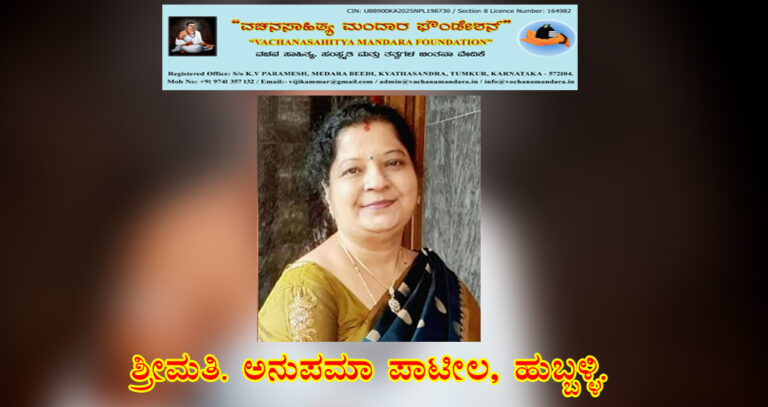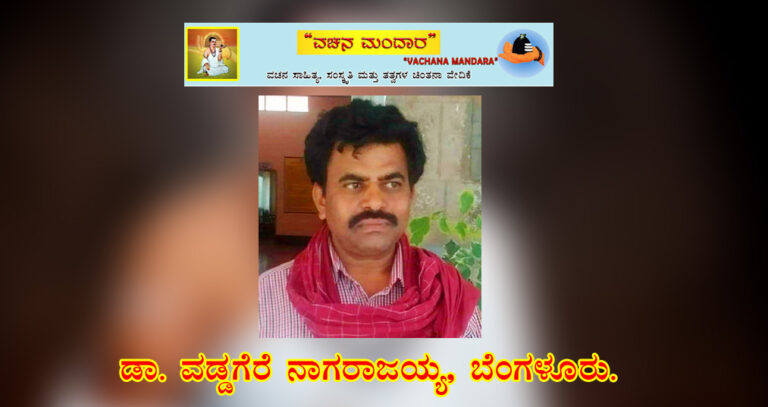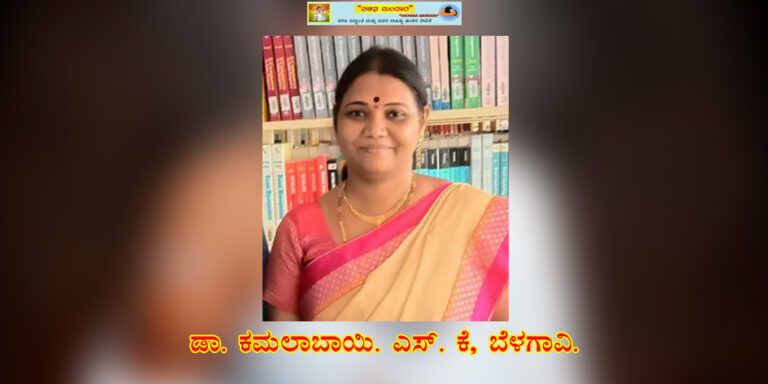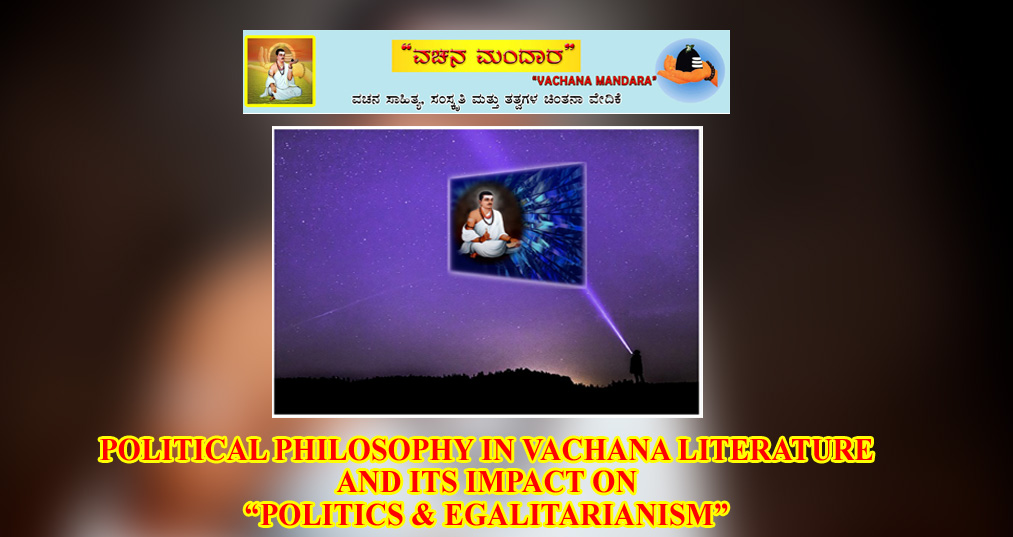
(Photo Courtesy: Internet)
INTRODUCTION:
Democracy, as a subject material in Political Science and Vachana Literature shows us very significant doctrines. Besides leading towards the path of egalitarian society, the principles written in Vachana Literature are far better than the modern day’s Political Theories and Values, which covers all gambit of Micro & Macro Socio-Economic Approaches, Religious as well as Political Science on a scientific temperament. The main focus of this article sets itself the nature of “Thinking from our Ancient Traditions and Cultures”. It will rather provide a new model for understanding the modern thinking by focusing on the way the Ancient Traditions and the Vachana Literature that talk about scientific temperament, essence of humanity and work culture. This article is one such humble attempt to bring out the essence of Political Ideology and Doctrines in Vachana Literature.
THE FRENCH REVOLUTION:
The French Revolution was a period of far-reaching social and political turmoil in France and its colonies beginning in 1789. The next few years featured political struggles within many liberal assemblies and right-wing supporters of the monarchy intent on uncomfortable key transformations.
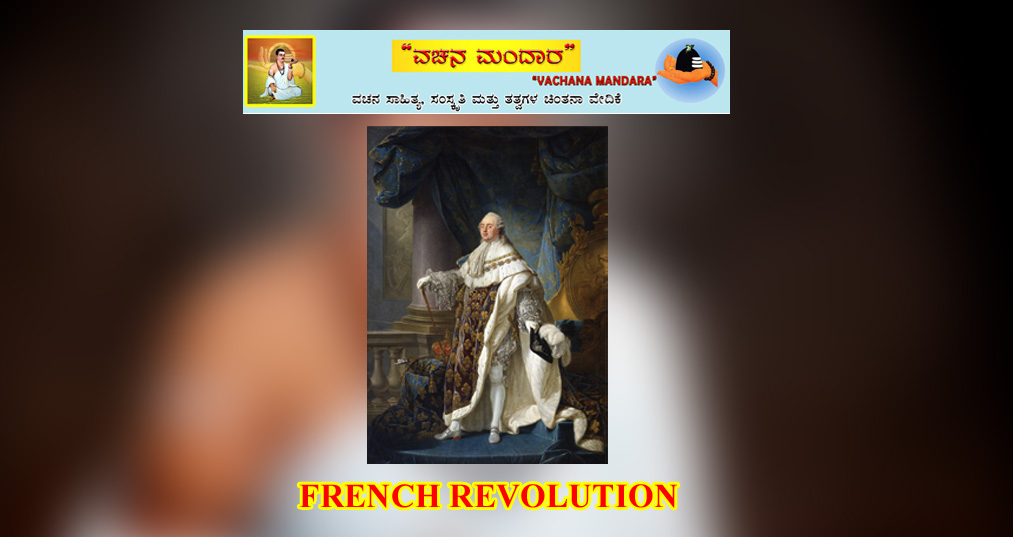
King Louis – XVI (Photo Courtesy: Internet)
Let us recall the repressive episode of French Revolution. King Louis-XVI with his misuse of power and his cruel administration, created social and economic inequality, financial mismanagement. The Republic was proclaimed in September, 1792 after a crucial incident that led to international condemnation, King Louis-XVI was executed in January 1793.
The radicals went on rampaging buildings and prisons. One of the prisons was horrible Barnet’s prison, where in thousands of prisoners were kept for years together. The revolutionaries went inside the prison and released the prisoners by cutting off their hand cuffs and other heavy locks and said; now you are free and go out and enjoy the freedom. The prison inmates were shocked and with the hesitation they went out of the horrible prison.
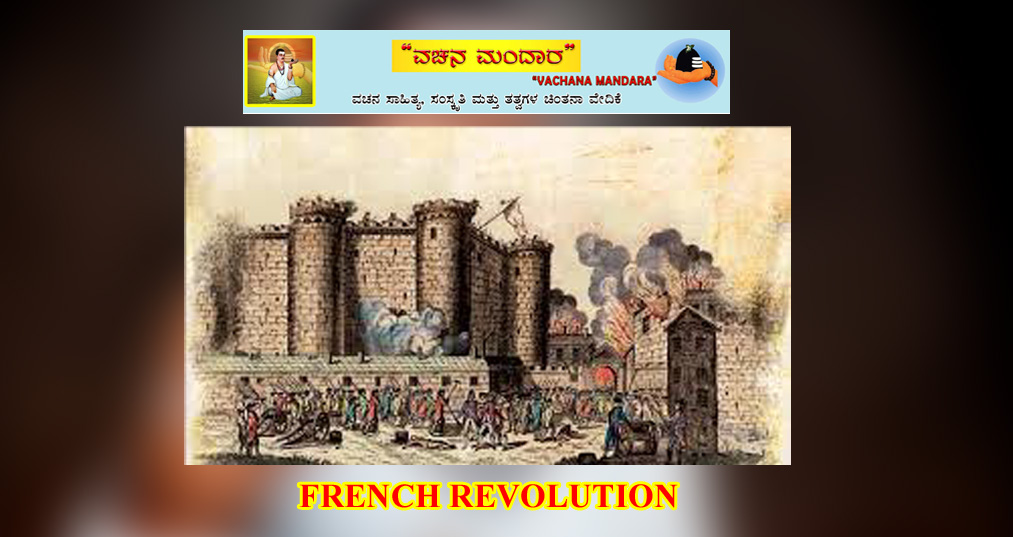
The Barnet’s jail (Photo Courtesy: Internet)
The radicals who released the prisoners, were shocked, when they saw half of the prisoners came back to the prison in the evening. They were even surprised to see that, when they slept, they put on the hand cuffs and heavy locks. With the shocking expression, a soldier asked a prisoner that why did they came back to prison? With tears in his eyes and with the gloomy voice said: we are living in this prison without the Sun light for 20 – 25 years, all of a sudden when we saw the light, our eyes not able to admit those bright light, we became literally blind. It is acceptable that all of a sudden, the eyes can’t receive the bright light, but why are those prisoners putting all that loads on them and slept. With almost weeping tone, the prisoner said that, these hand cuffs and loads have become part of our body and we can’t get sleep without these loads. What a painful story in the history of the mankind. What a sickening, humiliation and pathetic answer? Feels like the prisoners lost their soul and the spirit.
Today, in India, when we see our intellectuals, inspired people, critics wherever they are, however they are, somehow, don’t know, why it gives a very sad, similar horrible and terrible feeling of those prisoners of Barnet’s prison. The absolute truth of today’s Indian intellectuals, inspired people, critics turned blind and cannot tolerate the bright light of Independent Indian culture and philosophy. They are unable to sleep without praising someone or something, as they used to praise British rulers.
Kindly give a thought on this, whether Decolonization and Modernization are two different faces? After our Political Independence on 15th August 1947 and on 16th August 1947, we as an independent India really transformed into Modern India? Is Indian Language, Technology, Legal System, Education System, Police System, Defense System all together changed? Whether the rise of independent India with the transformation of Indian legacy, culture happened easily or naturally? Or, we have accepted the Westernization as a Modernization?
Whether we tried to search modernization for our own selfishness? Or, for the country as a whole? No, never. The people who fought for political independence, never tried to fight for the intellectual independence. In a way, all those who became silent and never be concerned for the intellectual independence are precarious and arrogant. This is the reality of independent India. It is biased crime that, to save our Indian Legacy and Culture our Intellectuals, Inspired People, Critics, they never tried and to tell this openly, feel frightened.
In this 75 year of independent India, we are under the serious threat of fake and buffoonery public debates, arguments, narratives and discourses. These 75 years are the misfortune years of independent India. What are the present real time questions? If we ask, the answer for the fundamental question which we can understand, we will definitely get the answer. But if the question itself is fake, we can debate and enjoy for years and we will never get the answer. All these debates end up in desperate, ridiculous debates.
This is the present-day satire, mockery and ridicule of Indian critics and intellectuals. The immediate requirement is an adventurous and brave intellectualism. We Indians are awaiting that great intellectualism. That intellectualism which does not care for its self-interest, if it says, says with commitment and conviction. Whatever it says, say the truth.
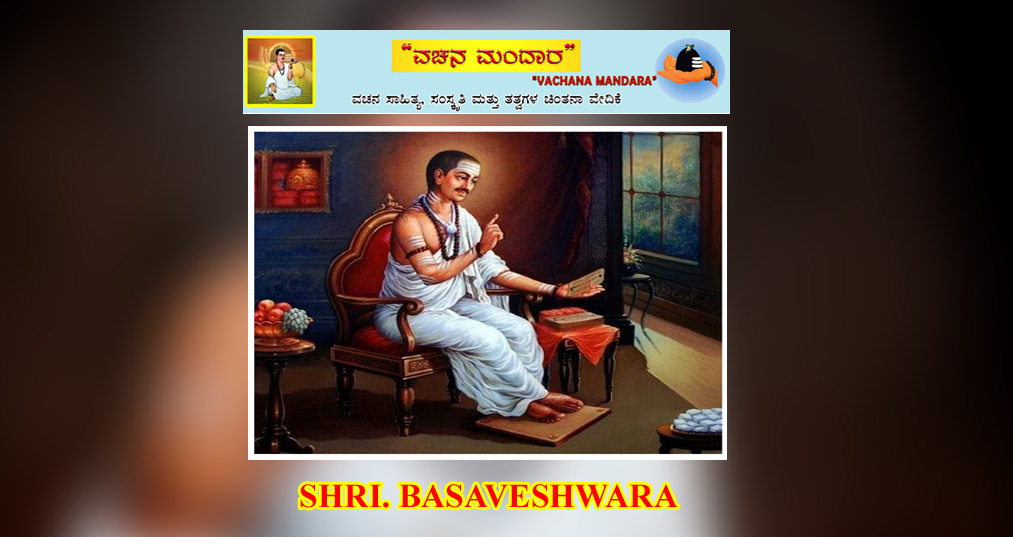
Shri Basaveshwara (Photo Courtesy: Internet)
With respect to the above narrative, a man rose to great heights, who never cared for the people who opposed and tried to suppress his intellectualism in Karnataka in 12th Century. The transformation he brought in the whole society in 12th century attracted the people all over the Country and said with commitment and conviction. The great man is none other than Shri Basaveshwara. At the center of turmoil of social and economic eco system, Basaveshwara brought the breeze of equality of caste system, equality of economic and financial system, equality of cultural system, equality of gender and that breeze even today giving life and living comforts. It is evident that the seeds of Modern Concepts of Political Philosophy,, Economy, Management and Total Revolution were sowed in Karnataka during 12th Century itself by the great revolutionary, Basaveshwara. His practical approach and act of establishment of Kayaka (Work) and Dasoha (Giving back to society) brought a new status and position for all the citizens of the society, irrespective of class, caste, creed and gender.
BIRTH AND CHILDHOOD BASAVESHWARA:
The folk song by Channamma says, Bagodi (Colloquial name for Bagewadi) is the town of worship of women, on top it, Basavanna welcomes every one standing at the door step of the entrance.
ಬಾಗೋಡಿ ಅಂಬೋದು | ಬಾಲೇರ ಪಟ್ಟಣ ||
ಮ್ಯಾಲೆ ಚೆನ್ನಮ್ಮನ | ಅರಮನೆ ||
ಬಾಗಿಲದಾಗ ಬಾಗಿ | ನಿಂದಾನ ಬಸವಣ್ಣ ||
Translitteration:
Bagodi ambodu | balera pattana ||
myale Chennammana | aramane ||
bagiladaga bagi | nindana Basavanna ||
Translation:
Bagodi is the town where cultured women live in.
On top of it there is palace of Chennamma.
Basavanna, stands in front of the door with all his humbleness.
Meaning: Folklore says, Bagewadi is the town which is synonymous with the cultured men and women live in. There are beautiful houses like palace. Basavanna, stands right in front of the door of the town with all his humbleness and piety, welcoming everyone.
Basavana Bagewadi, a town west of Shrishaila, a part of Taddawadi or Tardewadi province in ancient times. It is located 45 KM away from Vijayapura, the district place in Karnataka. It was a very famous Agrahara (Colony of Brahmins). In the early years of 12th century, the town was called “Ingaleshwara Bagewadi”, because it was an Agrahara of the flourishing town Ingaleshwara, 10 KM away. There were around 500 descendants of Mahajana or Brahmins. The whole village was studying and engaged in performing religious activities like Vedaghosha, Shivapurana and Shaiva Sangeetha. With the great scholars and experts living in the Agrahara naturally got the title Maha Agrahara.
Apart from Brahmins, other artisans were also living in harmony and it was a society with an exemplary case of great fraternity. In this Agrahara lived a Shaivite Brahmin Mundagi Lingabhatta. He had a son Mada (Madarasa, Mahadeva), a very religious young man, yet with great talents in managing practical affairs of the town. With his ability and experience Mada rose to be the Chief Gramani (Municipal Dignitary) of the Agrahara, and came to be called Madarasa. Madarasa had a son Devaraja and a daughter Nagalambike from his first wife Mayidevi. His first wife is from Arjunawada near Balligavi. Arjunawada is a village about 2 km from Hukkeri of Belgaum District. Madarasa married Madalambike (after Mayidevi died at a young age) a woman of deep religious beliefs and sterling qualities of characters. Madalambike was from Ingaleshwara. When Madarasa and Madalambike got a baby boy and they named him as Basaveshwara.
The boy Basaveshwara grew up in the company of his elder sister Akka Nagamma. The first soul that gave him the courage of conviction and moral support, was his sister Akka Nagamma. AkkaNagamma, who is mentor and it would be proper to call her as first Guru of Basaveshwara. Akka Nagamma was a woman of deep religious beliefs and sterling qualities of characters, at the same time revolutionary minded. Akka Nagamma completely transformed Basaveshwara into a scholar with qualitative religious beliefs and she was the catalyst of his revolutionary ideas and molded him for the mission in his life. That was a restricted cultural era for women; Akka Nagamma could not advance herself with her thoughts. She prompted her brother, Basaveshwara, who was like a ball of fire to implement her aim.
Basaveshwara’s mother Madalambike had three brothers, Siddharasa, Baladev and Shivadev. Last brother Shivadev (Shivaswamy) married her daughter Akka Nagamma. Another brother Baladev was minister in the court of King Bijjala. She moved to her husband’s place Ingaleshwara, when Basaveshwara was 4 years’ boy. He started to whither with the separation of his beloved sister.
Ambience of Sanskrit and Kannada was very well in Bagewadi and being a brilliant boy Basaveshwara learned Vaidika Shastra, Traditional Cultures, Vedas and Sanskrit with great zeal and enthusiasm. There used to be several religious rituals in Bagewadi and Basaveshwara as a child would want to know the meaning of everything.
When Basaveshwara reached the age of 8 years, his parents decided to perform Upanayana (Investing with the holy thread-Janivara) as per the Brahmin Tradition. Basaveshwara started raising several questions on the meaning of the Thread Ceremony and how did he need it. He also insisted that the thread ceremony also has to be done to his sister Akka Nagamma and insisted for equality between him and his sister. Basaveshwara refused to accept the ritual and this incident was a turning point in the life of Basaveshwara. This was the focal point of germination of the Social Revolution which transformed the whole society.
It was a moment of Karnataka’s spiritual revolution. It was supreme sacrifice for upholding what he conceived was right. A denial not only of the authority of his parents, but, also of the embarrassments of caste. Breaking the tradition was a big problem to his father Madarasa. Basaveshwara also thought over it and decided to leave his home once for all, he set out for Kudalasangama. This bold and firm decision of Basaveshwara at such a young age amazed everybody in Bagewadi. No doubt it was indicative of the great religious revolution that he was to bring about later in his life.
To provide help to Basaveshwara Akka Nagamma and her husband Shivadev (Shivaswamy) also went to Kudalasangama. It’s less known fact about, that of Basaveshwara lost his parents at the tender age. It is learnt that Muttabbe (Grand Mother) who looked after him with love and affection, besides Akka Nagamma. Both these women are the pillars of success of Basaveshwara, who brought the social revolution in the society.
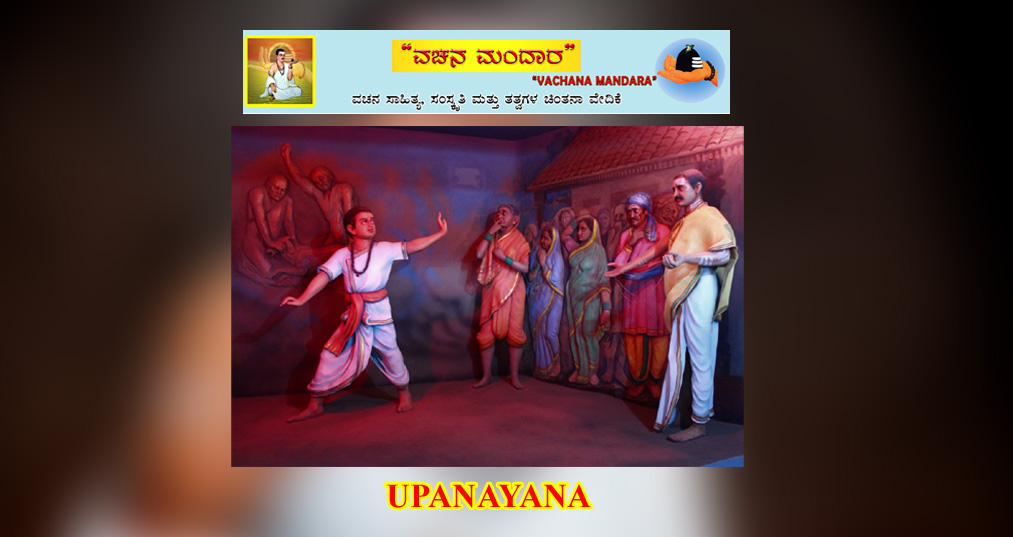
Basaveshwara rejecting the Upanayana (Photo Courtesy: Internet)
At Kudalasangama, Basaveshwara spent the next 12 years. Though Basaveshwara lived for 12 years at Kudalasangama, nothing more is known about what transpired during that period.
MARRIAGE AND CAREER OF BASAVESHWARA:
Baladev was brother of Madalambike (Mother of Basaveshwara). Baladeva felt, knowing brilliance and intellectual clarity, Basaveshwara would be suitable match for his daughter Gangambike. The marriage ceremony took place and at the time of marriage Basaveshwara was about 21 years old.
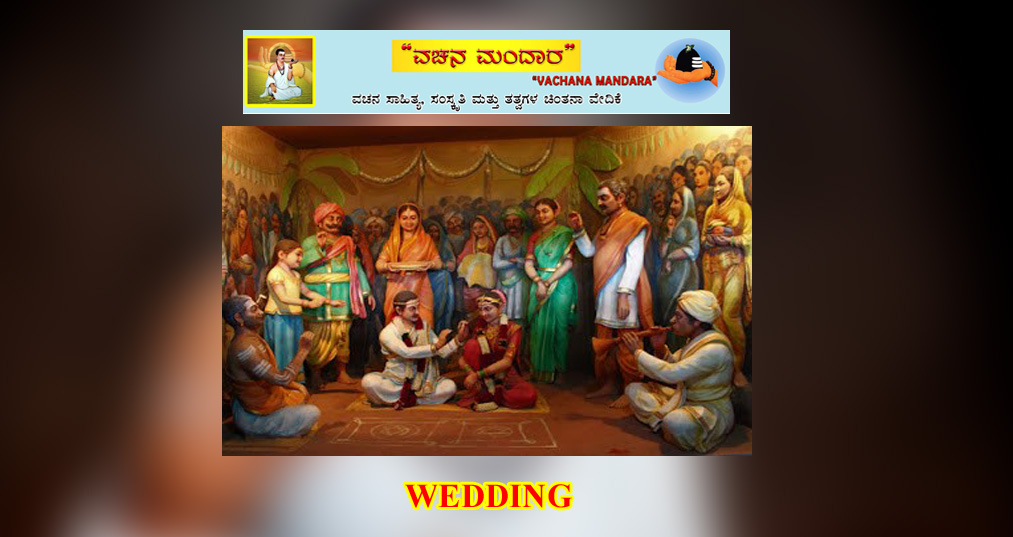
Basaveshwara’s wedding with Gangambike (Photo Courtesy: Internet)
King Bijjala lost his mother and his brother Karnideva was a young boy. Siddharasa who was a minister in the court of King Bijjala and his wife Padmagandhi looked after Karnideva as their own son. Siddharasa and Padmagandhi had a daughter by name Neelambike. She was also known as Neelamma, Neelagangambike and Neelalochane as well. Naturally Neelambike was looked after by King Bijjala as his own sister.
Neelambike, foster sister of king Bijjala, was an intimate friend of Gangambike. Both ate together, played together, brought up together. They had even decided to stay together for the entire life. How is it possible? It was possible only if they married a single man. Gangambike boldly expressed her desire to her father. Baladeva who never wanted to hurt the feelings of his daughter readily agreed to his daughter. Thus, Basaveshwara married to Neelambike as well.
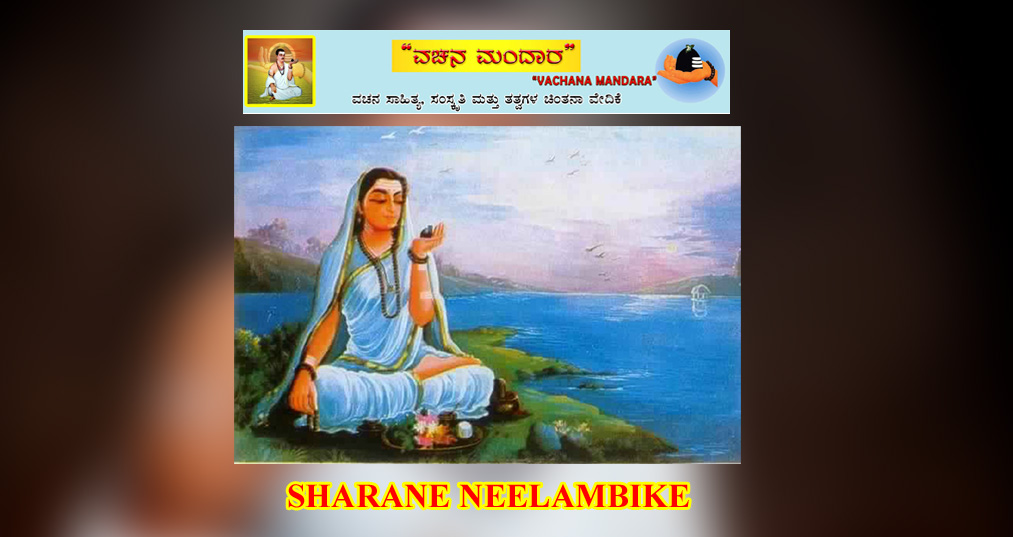
Sharane Neelambike (Photo Courtesy: Internet)
Basaveshwara had a very happy married life. Both Gangambike and Neelambike did their multi-faceted Socio-Religious rites very well and earned a respected name in the society. They treated huge number of guests with lot of respect, who were visiting their house. Well educated and cultured, both written Vachanas also, Gangambike with pen name “Gangapriya Kudalasangama” and Neelambike with pen name “Sangayya”. In the later stage, Gangambike had a son by name Chikkasangayya / Balasangayya / Siddharasa. But it may be learnt that he might have died at the tender age. Basaveshwara commenced his service in the King Bijjala’s court as a Karanika (clerk). During their stay here, his Father-in-Law Baladeva passed away. King Bijjala appointed Basaveshwara as his Prime Minister. They lived happily in Kalyan after the marriage till the assassination of King Bijjala in 1168 A. D.
VACHANA LITERATURE:
The Vachana literature written by Basaveshwara and many people who follow the holy path (in Lingayat Tenets we call them as Sharana-Sharaneyaru) had a revolutionary impact on the oppressed section of ladder system based Hindu society. These Vachanas mainly written to take care of the demoralized and oppressed people and to lift them out of their slavery mind set. The vachanas sparked the light of hope for the people and their sufferings under the orthodox Vedic traditions.
The mediaeval history says English was only a Creole Language that time. 12th Century Sharanas produced world literature, when there was no single line of literature in English. Ordinary people created extra-ordinary literature. Vachanas are based on Scientific Temperament, Compassion, Essence of Humanity and Work Culture. We are still lagging behind, not because of lacuna in the philosophy of Vachanas, but we are not spreading these ideas to the world.
Medieval India had the ladder system of society which had placed importance on mere rituals and caste system than human values and love of mankind. Basaveshwara and Sharanas, wrote Vachanas to eradicate the caste-based system and to bring the equality in the society. Vachanas written based on the day-to-day experiences of a common people speaking a common language, Kannada that each and every one can understand. Very simple, direct, specific meaning and narrative is there in the Vachana Literature. Never depended on any patronage from Kings and rulers. The origin or germination of Vachana Literature is mentioned in some Vachanas. One such Vachana of Channabasavanna says:
ವಚನ ರಚನೆಯ | ಅನುಭಾವವ ಬಲ್ಲೆವೆಂದೆಂಬರು ||
ವಚನವಾವುದು? ರಚನೆಯಾವುದು? | ಅನುಭಾವವಾವುದು? ಹೇಳಿರಣ್ಣಾ ||
ವಚನ: | ಆತ್ಮತುಷ್ಟಿಯನರಿವುದು ||
ರಚನೆ: ಸ್ಥಾವರ ಲಿಂಗ ಜಂಗಮ | ತ್ರಿವಿಧದಲ್ಲಿ ಕಾಣಬಲ್ಲರೇ ||
ಅನುಭಾವ: ಕಾಮದಿಚ್ಛೆಗೆ ಹರಿದು | ಮದ ಮಚ್ಚರವಿಲ್ಲದಿರಬೇಕು ||
ಆಸೆಯಾಮಿಷ ಹರುಷದಿಚ್ಛೆಗೆ ಹರಿದು | [ಯಾ] ಚಕನಾಗದಿರಬೇಕು ||
ಕಾಮ ಕ್ರೋಧ ಲೋಭ ಮೋಹ | ಮದ ಮಚ್ಚರ ಆಶೆಯಾಮಿಷ ||
ರೋಷಾದಿಗಳಂ ಹರಿದೊದೆದು | ಏಕೋಗ್ರಾಹಿಯಾಗಿ ನಿಂದಲ್ಲೇ ಅನುಭಾವಿ ||
ನಾಲ್ಕು ವೇದಶಾಸ್ತ್ರಂಗಳು | ಬಲ್ಲೆವೆಂದು ||
ನುಡಿವಾತನನುಭಾವಿಯೆ? ಅಲ್ಲ | ಅವು ಬ್ರಹ್ಮನೆಂಜಲು ||
ಇವ ಬಲ್ಲೆವೆಂದು | ನುಡಿವಾತನನುಭಾವಿಯೆ? ಅಲ್ಲ ||
ಆತನು ಇದಿರ ನಂಬಿಸಿ | ಉಂಬ ಭುಂಜಕನಯ್ಯ ||
ಕೂಡಲ | ಚೆನ್ನಸಂಗಮದೇವಾ ||
(ಸಮಗ್ರ ವಚನ ಸಂಪುಟ: ಒಂದು-2016 / ಪುಟ ಸಂಖ್ಯೆ-348 / ವಚನ ಸಂಖ್ಯೆ-526)
Transliteration:
Vachana rachaneya | anubhavava ballevendembaru ||
Vachanavavudu? rachaneyavudu? | anubhavavudu? heliranna ||
Vachana: | atmatushtiyanarivudu ||
Rachane: sthavara linga jangama | trividhadalli kanaballare || Anubhava: kamadichchege haridu | mada machcharavilladirabeku
Asheyamisha harushadichchege | haridu| [ya]chakanagadirabeku ||
Kama krodha lobha moha | mada machchara aseyamisha ||
Roshadigalam harododedu | ekograhiyagi nindalle anubhavi ||
Nalku vedashastrangaglu | ballevendu ||
Nudivatananubhaviye? alla | avu brahmanenjalu ||
Iva ballavendu | nudivatananubhaviye? Alla ||
Atanu idira nambisi | umba bhunjakanayya ||
Kudala | chennasangamadeva ||
Translation:
Those who say we have experience of awakened knowledge and awareness of writing Vachanas,
Please tell me which is writing? Which is experience of awakened knowledge and awareness?
Vachana: Only understands the inner awakening and consciousness.
Writing (Rachane): Shall only be seen where Sthavara (immobile), Linga (movable) and Jangama (society around us) is there.
Anubhava (experience of awakened knowledge): Shall only be achieved by completely removing lust, egomania and revulsion mania from mind.
Do not drift around without removing desires and excitements from mind.
The one who stands firm and concentrates with a unique goal and removes Lust, Anger, Greed, Crush, Egomania and Revulsion Mania from mind becomes Anubhavi (experience of awakened knowledge).
Whether only by knowing four Vedas, can a person become Knowledgeable? No. They are the left-over words from Brahma (God of Creator).
Is he Anubhavi (experience of awakened knowledge)? No. He is the cheater who violates all the ethics of life. O’ Lord Kudala Chennasangayya.
Meaning:
With out enlightening of our inner consciousness Vachanas are just a few lines which do not have the essence of life. Vachanas are those lines which removes our desires and greed from our mind and soul.
Vachana is the Triangular Confluence of Words, Writing and Anubhava (experience of awakened knowledge). It is not only for Creating, Writing and reading of Vachanas, it is for the satisfaction to the soul. When we act upon what we write and read it is the ultimate surrender to the Vachanas and literature as a whole.
“Burj Khalipha” in Dubai and “Taipe 101” in Taiwan are the 2 beautiful Skyscrapers in the world. Visitors to these places normally will have a look at these buildings. I had the privilege of visiting many times when I was working in MNC’s. As we rise to the top of the building through lift, can see the beautiful picture of the whole city and gives a feeling of happiness, rising up to the top most part of the building. In the same way, Sharanas written Vachanas by rising their Anubhava (experience of awakened knowledge) to that height. If we want to understand the real meaning of Vachanas we need to raise our intellectual proves to that extent. For that we need to have the triangular Confluence of Heart, Mind and Soul. Sharana Channabasavanna explains in his Vachana why Vachanas are written.
ಪಾತಾಳದಗ್ಘವಣಿಯ | ನೇಣಿಲ್ಲದೇ ||
ತೆಗೆಯಬಹುದೆ | ಸೋಪಾನ ಬಲದಿಂದಲ್ಲದೆ? ||
ಶಬ್ದ ಸೋಪಾನವ ಕಟ್ಟಿ | ನಡೆಯಿಸಿದರು ಪುರಾತರು ||
ದೇವಲೋಕಕ್ಕೆ | ಬಟ್ಟೆ ಕಾಣಿರೋ ||
ಮರ್ತ್ಯರ ಮನದ | ಮೈಲಿಗೆ ಕಳೆಯಲೆಂದು ||
ಗೀತಮಾತೆಂಬ ಜ್ಯೋತಿಯ | ಬೆಳಗಿ ಕೊಟ್ಟರು ||
ಕೂಡಲಚೆನ್ನಸಂಗನ | ಶರಣರು ||
(ಸಮಗ್ರ ವಚನ ಸಂಪುಟ: ಒಂದು-2016 / ಪುಟ ಸಂಖ್ಯೆ-301 / ವಚನ ಸಂಖ್ಯೆ-50)
Translitteration:
Pataladagghavaniya | nenillade ||
Tegeyabahude | sopana baladindallade? ||
Shabda sopanava katti | nadeyisidaru puratanaru ||
Devalokakke | batte kaniro ||
Martyada manada mailige | kaleyalendu ||
Geetamatemba jyotiya | belagi kottaru ||
Kudala Channasangana | Sharanaru ||
Translation:
We can bring the water from the deep well either by climbing down through stairs or with rope.
Ancestors created Vachanas with divine words which guides us to follow holy path.
It’s exactly like a decoration done to the Olympus.
These Vachanas will destroy the dirt in our mind.
The Kudala Channasanga Sharanas gave us the lamp of pious Poetry.
Meaning:
We can fetch water from the deep well with the help of rope or we have to climb down. The same way Vachanas are written to bring out the essence of life from the deep inside. The Vachanas are lit like a lamp in our soul to remove impurities arising in our mind and body. Vachanas are the gift from our Sharanas and Sharaneyaru.
In a very simple terms, Vachanas are like holy water, which we need to bring it up from the deep well either by Stairs or with the rope. The Vachanas brings us the hope of life. In the nut shell Vachanas are Pure Light and Holy Water. Akka Mahadevi narrates how Vachanas originated.
ಮರ ಮರ ಮಥನಿಸಿ | ಕಿಚ್ಚು ಹುಟ್ಟಿ ||
ಸುತ್ತಣ ತರುಮರಾದಿಗಳ | ಸುಡಲಾಯಿತ್ತು ||
ಆತ್ಮ ಆತ್ಮ ಮಥನಿಸಿ | ಅನುಭಾವ ಹುಟ್ಟಿ ||
ಹೊದ್ದಿರ್ದ ತನುಗುಣಾದಿಗಳ | ಸುಡಲಾಯಿತ್ತು ||
ಇಂತಪ್ಪ ಅನುಭಾವರ | ಅನುಭಾವವ ತೋರಿ ||
ಎನ್ನೊಡಲನುಳುಹಿಕೊಳ್ಳಾ | ಚೆನ್ನಮಲ್ಲಿಕಾರ್ಜುನ ||
(ಸಮಗ್ರ ವಚನ ಸಂಪುಟ: ಒಂದು-2016 / ಪುಟ ಸಂಖ್ಯೆ-819 / ವಚನ ಸಂಖ್ಯೆ-325)
Transliteration:
Mara mara mathanisi | kichchu hutti ||
suttana tarumaradigala | sudalayittu ||
atma atma mathanisi | anubhava hutti ||
hoddirda tanugunadigal | sudalayittu ||
intappa anubhavara | anubhavava tori ||
ennodalanuluhikolla | Chennamallikarjuna ||
Translation:
When tree rubs tree and fire is born.
The trees and shrubs around are set on fire.
When soul rubs soul and Anubhava (experience of awakened knowledge) is born.
The traits of body are all burnt.
Therefore O’ Lord Chennamallikarjuna save me by showing me the Anubhavi (experienced person of awakened knowledge).
Meaning:
In the deep dense forest the trees rub themselves which creates a spark and thereby the trees burn. The same way when intellectuals discuss the theme of wellbeing of life comes out. Here Sharane Akka Mahadevi requests her Lord Chennamallikarjuna to keep her in the company of intellectuals.
With great contributions from hundreds of Sharanas, the Vachana Literature originated @ 900 years back. This is the purest form of holy light enlightening the inner consciousness, spreading across the human life and space.
Vachana Literature is based on devotion and socio-economic reformation and advocates the monotheism (Belief in one God).
ದೇವನೊಬ್ಬ | ನಾಮ ಹಲವು ||
ಪರಮ ಪತಿವ್ರತೆಗೆ | ಗಂಡನೊಬ್ಬ ||
ಮತ್ತೊಂದಕ್ಕೆರಗಿದಡೆ | ಕಿವಿ-ಮೂಗ ಕೊಯ್ವನು ||
ಹಲವು ದೈವದ | ಎಂಜಲ ||
ತಿಂಬವರನೇನೆಂಬೆ ಕೂಡಲಸಂಗಮದೇವಾ? ||
(ಸಮಗ್ರ ವಚನ ಸಂಪುಟ: ಒಂದು-2016 / ಪುಟ ಸಂಖ್ಯೆ-57 / ವಚನ ಸಂಖ್ಯೆ-614)
Translitteration:
Devanobba | naama halavu ||
Parama pativratege | gandanobba ||
Mattondakkeragidade | kivi-mooga koyvanu ||
Halavu daivada | enjala ||
Timbavanenembe | Kudalasangamadeva ||
Translation:
God is one, names are many.
A chaste and faithful wife has just one husband.
If she desires another, he will chop off her ears and nose off.
For those who relish the leftover of many Gods.
What would you say O’ Lord Kudalasangamadeva?
Meaning:
Basaveshwara philosophy advocates monotheism. There is only one God and we can call him with many names. Here Basaveshwara gives very classic comparison of a wife who is faithful to his husband should not desire for another. Its like chopping off her ears and nose, which is insult to a chaste woman in the society. Believing and worshipping many Gods is like eating leftover food of many people. Basaveshwara questions Lord Kudalasangamadeva that, what would you say to such people, who worships many Gods.
POLITICAL SCIENCE:
The term Polity is derived from the word “Police” meaning Govern, Control and Regulate. Science is a systematic study that builds and organizes knowledge in the form of testable explanations and predictions.
Political Science is defined as the systematic study of governance by the application of empirical and scientific methods analysis.
Political Science is the systematic study of the State, Nation, Government and its Public Policies.
ಎನ್ನಂತರಂಗದೊಳಗೆ | ಅರಿವಾಗಿ ||
ಎನ್ನ ಬಹಿರಂಗದೊಳಗೆ | ಆಚಾರವಾಗಿ ||
ನೀನೆಡೆಗೊಂಡು | ಎನ್ನ ಮನದೊಳಗೆ ||
ಘನ ನೆನಹಾಗಿ | ಮೂರ್ತಿಗೊಂಡು ||
ಗುರುಸ್ಥಲ ಲಿಂಗಸ್ಥಲ | ಜಂಗಮಸ್ಥಲ ಪ್ರಸಾದಿಸ್ಥಲವೆಂಬ ||
ಚತುರ್ವಿಧವನೂ ಎನಗೆ | ಸ್ವಾಯತವ ಮಾಡಿ ತೋರಿ ||
ಪ್ರಾಣಲಿಂಗವೆಂಬ ಹಾದಿಯ | ಸೆರಗ ತೋರಿಸಿ ||
ಎಲ್ಲಾ ಅಸಂಖ್ಯಾತರನೂ | ಪಾವನವ ಮಾಡಿದಿರಾಗಿ ||
ಕೂಡಲಸಂಗಮದೇವಾ | ನಿಮ್ಮಿಂದ |||
ಸಕಲ ಸನುಮತವ | ನಾನರಿದೆನಲ್ಲದೆ ||
ಎನ್ನಿಂದ ನೀನಾದೆ | ಎಂಬುದ ||
ನಿಮ್ಮ ಪ್ರಮಥರು | ಮೆಚ್ಚರು ನೋಡಯ್ಯಾ ||
(ಸಮಗ್ರ ವಚನ ಸಂಪುಟ: ಒಂದು-2016 / ಪುಟ ಸಂಖ್ಯೆ-97 / ವಚನ ಸಂಖ್ಯೆ-1077)
Transliteration:
Ennantarangadolage | arivagi ||
Enna bahirangadolage | acharavagi ||
Neededegondu | enna manadolage ||
Ghana nenahagi | murhtigondu ||
Gurusthala lingasthala | jangamasthala prasadisthalavemba ||
Chaturvidhabanu enage | svayatava madi tori ||
Pranalingavemba hadiya | seraga torisi ||
Ella asamkhyataranu | pavanava madidiragi ||
Kudalasangamadeva | nimminda ||
Sakala sanumatava | nanaridenallade ||
Enninda neenade | embuda ||
Nimma pramatharu | mechcharu nodayya ||
Translation:
Created awareness in my heart.
Taught me how to behave piously, politely in the society.
Created immaculate place in my mind with your existence.
Your immortal soul consolidated like an idol in my conscious.
Stages of fulfillment, Gurusthala (Awareness Stage), Lingasthala (Culture & Tradition Stage), Jangamasthala (Stage of Respecting Society as a whole), Prasadisthala (Stage of bliss within).
Shown the expedient to acquire four stages of fulfillment.
Showing the path to reach the Pranalingi (Stage of realization of inner awareness) from unfaithful stage.
Made myriad people holy.
O’ Lord Kudalasangamadeva, you have taught me all the Awareness and Tenets.
If I say, you have attained respect because of me.
Your disciples or devotee will not accept and appreciate it,
Meaning:
O’ Lord Kudalasangamadeva, you have enlightened my inner consciousness and shown the way how to act piously, politely in the society. Created immaculate place in my mind and soul with your blessed existence. Shown the ways and means to acquire four tenets, Gurusthala (Awareness Stage), Lingasthala (Culture & Tradition Stage), Jangamasthala (Stage of Respecting Society as a whole), Prasadisthala (Stage of bliss within). Giving proper direction to myriad people to move on the holy path to acquire the stage of effulgent soul (Pranalingi). Whatever I have acquired, each and everything is from you, my Lord. Your disciples or devotee will not accept and appreciate it, if I say, you have attained respect because of me.
The above Vachana says all about the behaviors of the people in the society. It also educates the people about their power and the commitment to the welfare of the society and for the self-realization as well.
ಅಂಜದಿರು | ಅಳುಕದಿರು ||
ಕುಂದದಿರು | ಕುಸಿಯದಿರು ||
ಏನೋ ಎಂತೋ | ಎಂದು ಚಿಂತಿಸದಿರು ||
ನಿನ್ನ ನಾನೇನುವನೂ ಬೇಡೆ | ಕೂಡಲಸಂಗಮದೇವಾ ||
(ಸಮಗ್ರ ವಚನ ಸಂಪುಟ: ಒಂದು-2016 / ಪುಟ ಸಂಖ್ಯೆ-86 / ವಚನ ಸಂಖ್ಯೆ-969)
Transliteration:
Anjadiru | alukadiru ||
Kundadiru | kusiyadiru ||
Eno ento | endu chintisadiru ||
Ninna nanenuvanu bede | Kudalasangamadeva ||
Translation:
Don’t be scared, don’t be frightened.
Don’t feel upset and don’t feel depressed.
Don’t worry about what is going to happen.
O’ Lord Kudalasangamadeva, I don’t demand or ask any favors from your good self.
Meaning:
Vachana delivers the message to the society of commitment and conviction with which execute their responsibility. Not to be scared to do good activities and act without fear. Without any expectations from God, will do the best for the society.
Political Science draws its ideas and theories from many branches of knowledge like Sociology, Philosophy, Psychology, Anthropology and many more. The main focus is on power of the people and people involved in the governance. We can see 2 main streams of Political Science
- Political Obligation: Deals with the ideas and values such as Rights, Justice, Freedom and obligation.
- Political Behavior: Deals with the institutions, behavioral patterns, factors influencing empirical observations.
Since Political Science is all about people, it become significant or very much important to study. Because, it covers all facets of the society and people involved in it, including every citizen and even people on the streets as well. Politics impacts our lives, both directly and indirectly, whether we are aware of it or not.
THE CONSTITUTION OF INDIA:
The Constitution of India is the longest written constitution of any country and is the supreme Law of India. The Constitution is a legal sanctity document covers:
Principal functions of the government. Fundamental Political Code, Structure, Procedures, Powers and duties of Government institutions and sets out fundamental rights.
- Provides basic political system under which people are to be governed. Directive principles and duties of citizens.
- Defines the powers of the main organizations of the state, democrats their responsibilities and regulates their relationship which each other and with people.
- It also be termed as “Fundamental Law” of a country which reflects people’s faith and aspirations.
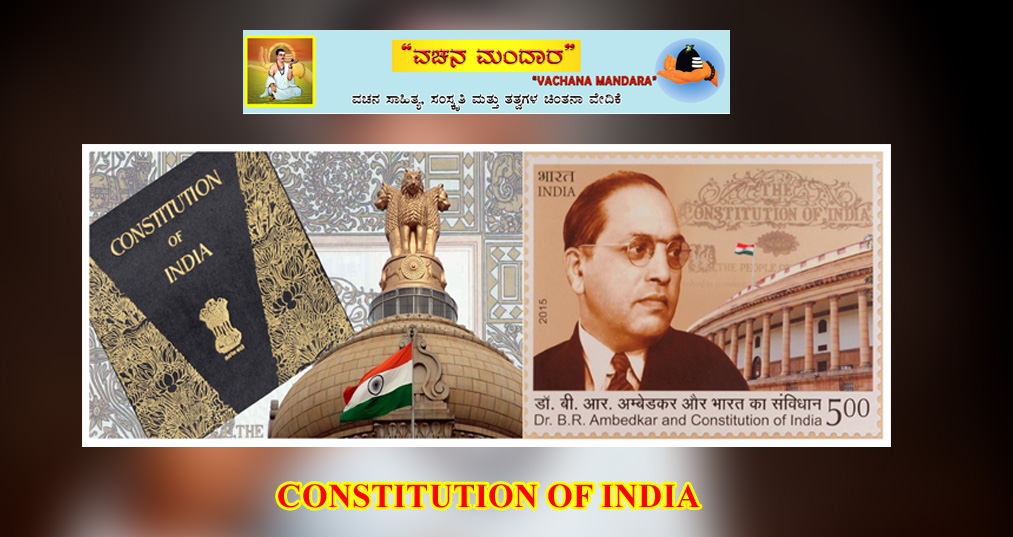
The Constitution of India (Photo Courtesy: Ministry of Law & Justice, GOI)
ಕರ್ತನಟ್ಟಿದಡೆ ಮರ್ತ್ಯದಲ್ಲಿ | ಮಹಾಮನೆಯ ಕಟ್ಟಿದೆ ||
ಸತ್ಯಶರಣರಿಗೆ ತೊತ್ತು ಭೃತ್ಯನಾಗಿ | ಸವೆದು ಬದುಕಿದೆನು ||
ಕರ್ತನ ಬೆಸೆದು | ಮತ್ತೆ ಬರಲೆಂದಟ್ಟಿದಡೆ ||
ಕೂಡಲಸಂಗಮದೇವರ ನಿರೂಪಕ್ಕೆ | ಮಹಾಪ್ರಸಾದವೆಂದೆನು ||
(ಸಮಗ್ರ ವಚನ ಸಂಪುಟ: ಒಂದು-2016 / ಪುಟ ಸಂಖ್ಯೆ-103 / ವಚನ ಸಂಖ್ಯೆ-1133)
Transliteration:
Kartanattidade martyadalli | mahamaneya kattide ||
satya sharanarige tottu bhratyanagi | savedu bdukidenu ||
kartana besedu | matte baralendattidade ||
kudalasangamadevara nirupakke | mahaprasadavenenu ||
Translation:
Wherever my master asks me to go, I am determined go to any place in the mortal world and I will build a great house there.
I am determined to spend my life being a humble servant to all my brothers.
Whenever master says go again and again to the mortal world.
I am determined to accept the same with all humbleness as my Lord Kudalasangamadeva’s blessings.
Meaning:
With the blessings from God, built a house (Literally means living comforts) in this earth. Being a brother, I will serve all my life to the betterment of their life. Even if God (Kudalasangamadeva) orders me to come again, I will take it as a blessing from Lord to serve my brothers and sisters again.
Basaveshwara believed that carrying the jealousy & hatred in the mind and body, we cannot bring the equality & harmony in the society. Right from his childhood, he looked and stood upon to see every individual of the society are same. At the same time, Basaveshwara made the whole society as his living comforts, in fact as a home. The whole people around him fostered & looked as their own family member. Since every individual of the society came together and took active part in the revolution of equality of economy, caste and culture, it was successful. This is the basic Philosophy, Formula or Theory or Principle, whatever we can say, of the Political Science i.e., “Inclusiveness”.
The Constitution of India was adopted by the “Constituent Assembly of India” on 26th of November 1949 and became effective on 26th of January 1950. The Constitution replaced the “Govt of India Act 1935” as the country’s fundamental governing document, and the “Dominion of India” became the “Republic of India”. India celebrates its Constitution Day on 26th January as Republic Day.
The Constitution of India declares:
India as a Sovereign, Socialist, Secular and Democratic Republic.
- Assures its citizens Justice, Equality and Liberty and endeavors to promote Fraternity.
- The words “Secular” and “Socialist” were added to the preamble by “42nd Amendment Act” in 1976 during the emergency.
The original 1950-Constitution Document is secured and preserved in a Helium filled casing at the Parliament House in New Delhi. The efforts to frame the Constitution started in 1934. A Socialist leader Mr. M N Roy started putting pressure on British government to form “The Constituent Assembly of India”
FRAMING THE CONSTITUTION OF INDIA:
The efforts to frame the Constitution started in 1934. Mr. M N Roy, a determined personality of Communist Movement in India, started putting pressure on British government to form “The Constituent Assembly of India”. With the efforts of many leaders Shri. Rajagopalachari and many more, a statement were made by Viceroy Lord Linlithgow about forming “The Constituent Assembly of India” and came into existence on 8th August 1940 and is named as “August Offer”. The then British Prime Minister Clement Attlee, the Secretary of State to India Lord Pethick Lawrence, President of the Board of Trade Sir Stafford Cripps, First Lord of the Admiralty A V Alexander, Viceroy of India Lord Wavel were the members of the Constituent Assembly of India.
In the month of July-August 1946 elections were held indirectly to elect the members of the Provincial Assembly Parliament. 389 representatives were elected, 296 were British India, 93 Princely State representatives, including 15 women. Out of 296 British India representatives, 208 from Congress, 73 from Muslim League and 15 Independent representatives. With 211 members attending, in 9th December 1946, Assembly started its session.
The following are the women who were the representatives of the Constituent Assembly of India:
- Sarojini Naidu
- Rajkumari Amrita Kaur
- Ammu Swaminathan
- Hansa Mehta
- Sucheta Kripalani
- Durgabai
- Kudzai Azula Rasullah
- Vijayalakshmi Pandit
- Purnima Banerji
- Kamala Chowdhary
- Drakshayani Velayudhan
- Leela Roy
- Malati Chowdhary
- Anni Muscarine
- Renuka Roy
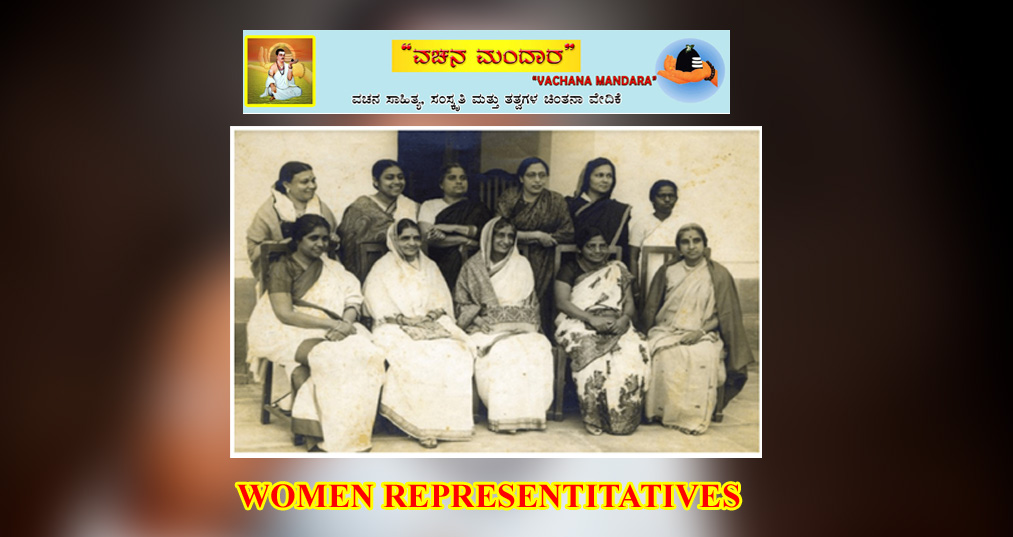
Women representatives of the Constituent Assembly
(Photo Courtesy: Ministry of Law & Justice, GOI)
The following are the Kannadiga’s who were the representatives of the Constituent Assembly of India:
- Mysore Region:
K C Reddy
K Hanumantayya
T Siddhalingayya
Madhava Rao - Mumbai Region:
S Nijalingappa
R R Diwakar - Coorg Region:
K M Ponnachcha
DRAFT COMMITTEE OF THE CONSTITUTION OF INDIA:
The efforts to drafting the Constitution started in 1946. Shri. Bengal Narasing Rao (1st Judge of International Court of Justice and also President of UN Security Council) was appointed as advisor to the draft committee. Shri. B N Rao prepared and produced the draft in February 1948. On 29th August 1947, appointed a Drafting Committee to scrutinize the draft of the Constitution of India prepared by Constitutional Adviser Shri B N Rao.
The Drafting Committee had seven members:
- Dr. B R Ambedkar – Chairman
- Alladi Krishnaswami Ayyar
- N. Gopala Swami
- K.M Munshi
- Mohammad Saadulla
- N Madhava Rao (appointed after B.L. Mittal resigned)
- T T Krishnamachary (appointed after D.P. Khaitan died)
The assembly approved the draft on 26th November 1949 and adopted the Constitution. This day is celebrated as “National Law Day” or Constitution Day” to promote and spread the thoughts and the importance of Constitution. The hand written Constitution document, one in Hindi and the other in English signed by 283 members of the assembly. The Constitution was published in Dehradun and Photolithographed by Survey of India. 2 months later, on 26th January 1950, it became the “Law of India”.
Since independence, the Constitution of India, delivers the fundamental rights of humanity and social equality. We can see the same concept implemented and was achieved in Kalyana way back in 12th Century by Basaveshwara. Very important to note here is the whole society was a “Functioning Democracy” based on freedom of expression, equality and humanity. Under the umbrella of Anubhava Mantapa people from various Caste, Class, including Women were involved in creating the egalitarian society.
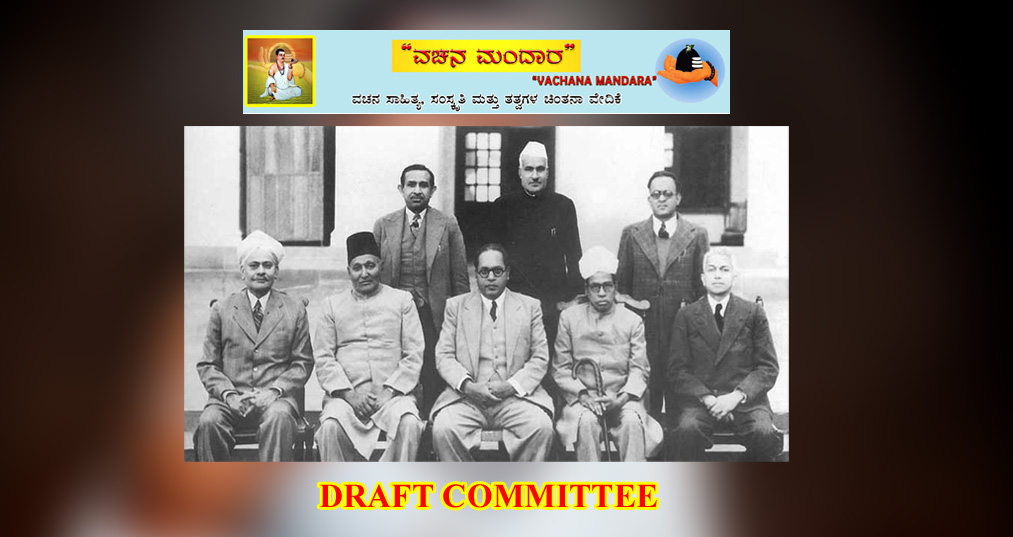
Constitution Draft Committee
(Photo Courtesy: Ministry of Law & Justice, GOI)
ಮಡಕೆಯ ಮಾಡುವಡೆ | ಮಣ್ಣೆ ಮೊದಲು ||
ತೊಡಿಗೆಯ ಮಾಡುವಡೆ | ಹೊನ್ನೆ ಮೊದಲು ||
ಶಿವಪಥವನರಿವಡೆ | ಗುರುಪಥವೆ ಮೊದಲು
ಕೂಡಲಸಂಗಮದೇವನರಿವಡೆ | ಶರಣರ ಸಂಗವೆ ಮೊದಲು ||
(ಸಮಗ್ರ ವಚನ ಸಂಪುಟ: ಒಂದು-2016 / ಪುಟ ಸಂಖ್ಯೆ-16 / ವಚನ ಸಂಖ್ಯೆ-70)
Transliteration:
Madakeya maduvade | manne modalu ||
Todigeya maduvade | honne modalu ||
Shivapathavanarivade | gurupathave modalu ||
Kudalasangamadevaranarivade | sharanara sangave modalu ||
Translation:
To make a pot earth comes first. To make ornaments gold comes first. To know the path of Shiva, path of Guru comes first. To know Kudalasangamadeva, Company of Sharanas comes first.
Meaning:
To have the better way of life, various comparatives are given in this Vachana. To make a pot, first thing required is clay. Gold is coming first to make ornaments. Guru or awareness is extremely important and essential to know the path of Shiva or holy way of living. In knowing Lord Kudalasangamadeva or to have the ambrosia of life, the companionship with good people (Sharanas) is important.
The Vachana clearly says, to start any work need scholars to contribute. As the narrative indicates many scholars and intellectuals contributed to document the Constitution of India that is why Constitution of India is very much appreciated by the entire world. It is the longest document in the history of Constitution of any country. We are very much proud of it.
MAGNA CARTA FOR MANKIND:
If we travel to trace back the origin of the word “Parliament”, we reach “The Battle of Hastings” of 14.10.1066. This war between French Army led by Williams Norman (Duke of Normandy) and English Army led by the King Herald Godwinson took place at Hastings (Present district in East Sussex). Williams Norman won the war and established the administration. He used to discuss various issues in the region with the rich and powerful landlords. These meetings and sessions are called as Parliament. This is the source of germination of the word “Parliament”.
From 1166 CE to 1216 CE King John Lackland ruled England. He was stubborn, adamant and anarchical King by nature. These parliaments started experiencing irksomely. His behavior led to civil wars and friction in the beginning of 12th Century. With this, citizen especially farmers are affected badly and they have started rebelling against King John Lackland.
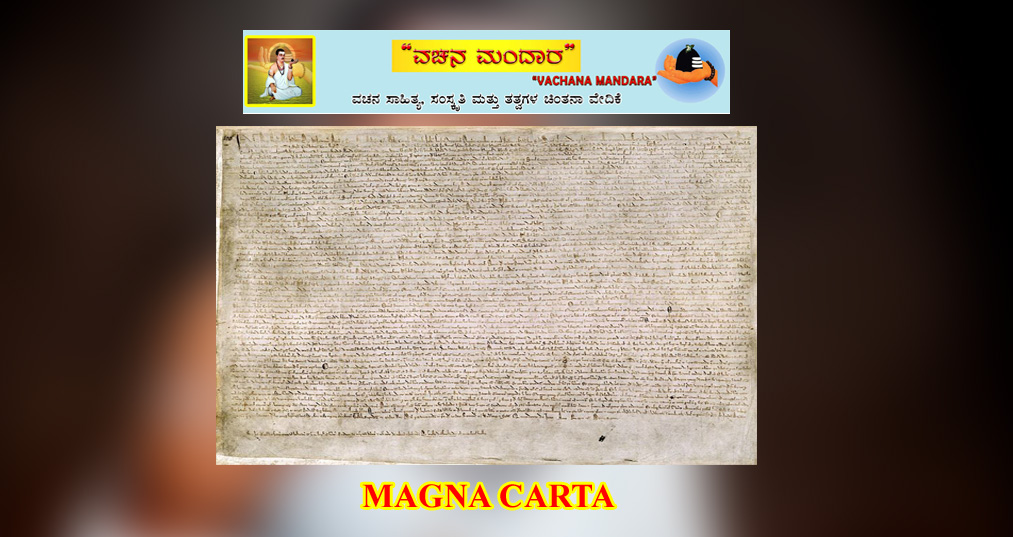
Rare document out of four of MAGNA CARTA (Photo Courtesy: Internet)
To avoid further disasters, King John Lackland came to an agreement to sign a contract. This agreement is named as “Magna Carta” which was signed in 1215 CE. Runnymede graziery is the place between the rivers Windsor and Stains. With seal of King Lackland the agreement was signed on 15.06.1215, between Landlords and King John Lackland. This agreement gives power and rights to farmers and citizens. This became the platform to the constitutions of various countries in Europe.
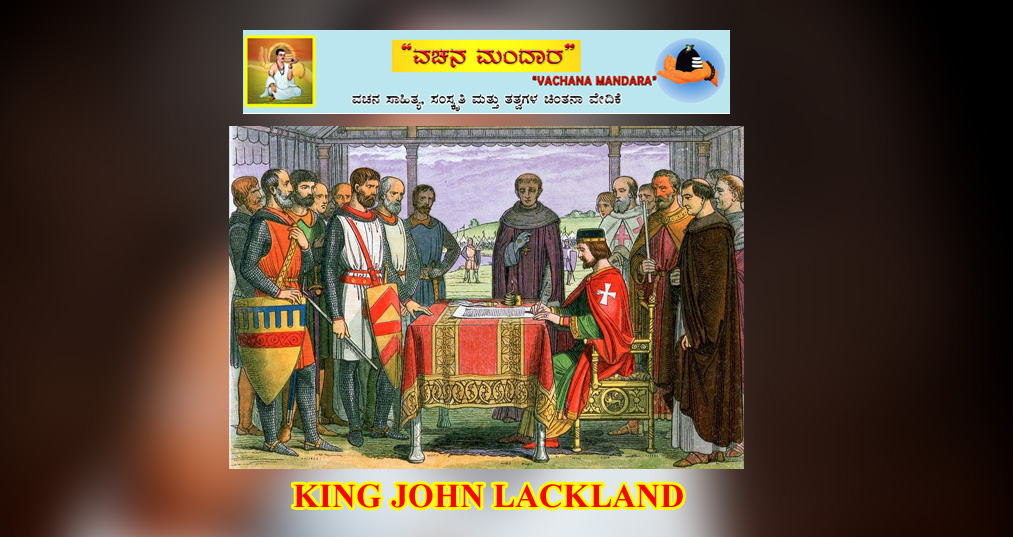
King John Lackland signing Magna Carta (Painting: James William Edmond Doyl-19th Century) (Photo Courtesy: Internet)
There are 13 copies Magna Carta are available. 8 copies belong to the era of King Henri-III, 5 copies belong to the era of King Edward-I. Australian Govt purchased in 1952 by paying £12,500 to a copy which belong to the era of King Edward-I and kept in parliament house in Canberra. American Politician Ross Perrot purchased another copy in 1984, which belong to the era of King Edward-I and kept in US National Archive. In the year 1791 USA framed its constitution based on Magna Carta platform.
These ideas became the basis of Civil and Democratic rights. Basaveshwara, in fact laid the foundation for all these human rights 100 years before Magna Carta was signed.
John Simon Bercow, who was the speaker of British Parliament between 2009 to 2019, shown great respect for Basaveshwara and said very profound about Basaveshwara’s Philosophy of Universal Significance.
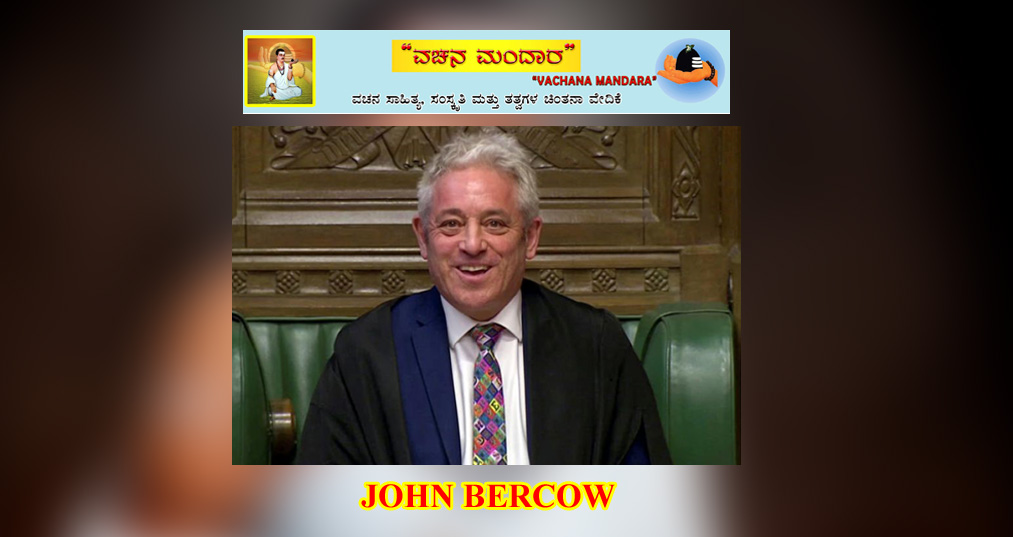
Mr. John Simon Bercow (Photo Courtesy: Internet)
Basaveshwara pioneered the idea of democracy and stood for civil liberties even before Magna Carta was signed and preached the idea of democracy 700 years before Abraham Lincoln. It is amazing & extraordinary that, Basavanna professed, adopted, campaigned and advocated genuine democracy, human rights, gender equality, way back in the 12th century even before anyone in UK had even thought about it.
UNITED NATIONS:
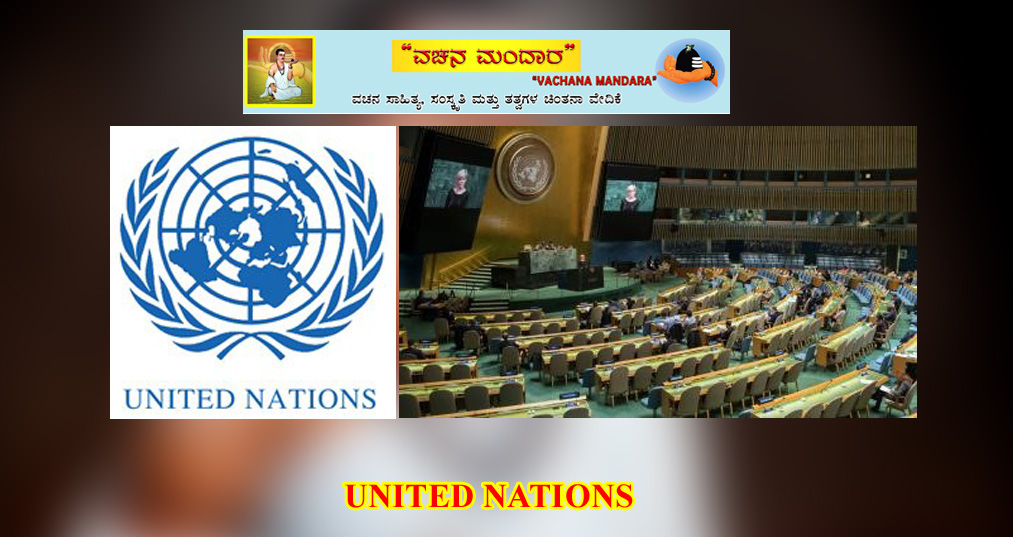
(Photo Courtesy: UN Website)
The UN established after World War II with the aim of preventing future wars, succeeding the ineffective League of Nations. Governments of 50 countries met in San Francisco, on 25 April 1945, for a conference and started drafting the UN Charter, which was adopted on 25 June 1945 and came to effect on 24 October 1945. At its founding, the UN had 51 member states; there are now 193, representing the vast majority of the world’s sovereign states.
The United Nations (UN), is an inter-governmental organization, responsible for maintaining international peace and security, developing friendly relations among nations, achieving international cooperation, and being a center for harmonizing the actions of nations. It is the largest, most familiar, most internationally represented and most powerful inter-governmental organization in the world.
The UN is headquartered on international territory in New York City; other main offices are in
- Geneva (Switzerland)
- Nairobi (Kenya)
- Vienna (Austria)
- The Hague (Netherlands)
The UN has six principal organizations:
- The general Assembly (UNGA)
- The Security Council (UNSC)
- The Economic and Social Council (ECOSOC)
- The Trusteeship Council (UNTC)
- The International Court of Justice (ICJ)
- The UN Secretariat (UNS)
1. THE GENERAL ASSEMBLY (UNGA):
The United Nations General Assembly (UNGA or GA) is one of the six principal organs of the United Nations (UN), the only one in which all member nations have equal representation. The main objective is policy-making as a representative organ of the UN. Its powers are to oversee the budget of the UN, appoint the non-permanent members to the Security Council, appoint the Secretary-General of the United Nations, receive reports from other parts of the UN, and make recommendations in the form of General Assembly Resolutions.
2. THE SECURITY COUNCIL (UNSC):
The United Nations Security Council (UNSC) is responsible for ensuring international peace and security, accepting new members to the United Nations and approving any changes to its charter. Its powers include the establishment of peacekeeping operations and international sanctions as well as the authorization of military actions through resolutions – it is the only body of the United Nations with the authority to issue binding resolutions to the member states.
The Security Council consists of fifteen members. The great powers that were the victors of World War II – the Soviet Union (now represented by Russia), the United Kingdom, France, Republic of China (now represented by the People’s Republic of China), and the United States – serve as the body’s five permanent members. These can veto any substantive resolution, including those on the admission of new member states or nominees for the office of Secretary-General. In addition, the council has 10 non-permanent members, elected on a regional basis to serve a term of two years. The body’s presidency rotates monthly among its members.
3. THE ECONOMIC AND SOCIAL COUNCIL (ECOSOC):
The United Nations Economic and Social Council (ECOSOC) is responsible for coordinating the economic and social fields of the organization, specifically in regards to the 15 specialized agencies, the eight functional commissions and the five regional commissions under its jurisdiction. The Council serves as the central forum for discussing international economic and social issues and formulating policy recommendations addressed to member states and the United Nations system.
4. THE TRUSTEESHIP COUNCIL (UNTC):
The United Nations Trusteeship Council is established to ensure that trust territories were administered in the best interests of their inhabitants and of international peace and security. The trust territories—most of them former mandates of the League of Nations or territories taken from nations defeated at the end of World War II—have all now attained self-government or independence, either as separate nations or by joining neighboring independent countries.
5. THE INTERNATIONAL COURT OF JUSTICE (ICJ):
The International Court of Justice (ICJ), sometimes called the World Court, is the principal judicial organization of the United Nations (UN). The ICJ’s primary functions are to settle international legal disputes submitted by states (contentious cases) and give advisory opinions on legal issues referred to it by the UN (advisory proceedings). Through its opinions and rulings, it serves as a source of international law.
The ICJ comprises a panel of 15 judges elected by the General Assembly and Security Council for nine-year terms. The court is seated in the Peace Palace in The Hague, Netherlands, making it the only principal U.N. organization located outside the New York City. Its official working languages are English and French.
6. THE UN SECRETARIAT (UNS):
The United Nations Secretariat is the United Nations’ executive arm. The Secretariat has an important role in setting the agenda for the UN’s deliberative and decision-making bodies of the UN (the General Assembly, Economic and Social Council, and Security Council), and the implementation of the decision of these bodies. The Secretary-General, who is appointed by the General Assembly, is the head of the secretariat.
The secretariat is the main source of economic and political analysis for the General Assembly and Security Council; it administers operations initiated by UN’s deliberative organs, operates political missions, prepares assessments that precede peacekeeping operations, appoints the heads of peacekeeping operations, conducts surveys and research, communicates with non-state actors such as media and non-government organizations, and is responsible for publishing all of the treaties and international agreements.
The UN System includes a multitude of specialized agencies, such as
- The World Bank Group (WB)
- The World Health Organization (WHO)
- The World Food Programme (WFO)
- United Nations Educational, Scientific and Cultural Organization (UNESCO)
- United Nations Children’s Fund (UNICEF)
Additionally, non-governmental organizations may be granted consultative status with ECOSOC and other agencies to participate in the UN’s work. The UN’s chief administrative officer is the Secretary-General, currently Portuguese politician and diplomat “António Guterres” since 1 January 2017. The organization is financed by assessed and voluntary contributions from its member states.
ANUBHAVA MANTAPA:
With this we are stepping into the Socio-Political Era of Basaveshwara. Even at the time he came to Kalyana, it seems Basaveshwara had chalked out in his mind a program of Spiritual Awakening. Beliefs of high born and low born had broken the society into pieces. Meaningless rituals had become important and there was no equality in the society, no social and economic justice. The essence of religion had slipped to the back door. Tangible devotion and virtuous life had disappeared.
Basaveshwara formed a new spiritual institution experimented on a democratic foundation and that was called “Anubhava Mantapa”, with an aim to provide a platform for a socio-philosophical debate leading to a casteless society, bring equality and popularize the concept of Kayaka (Work) and Dasoha (Giving back to the society). Any one, whatever his or her caste by birth, could become a member. Women were also allowed to join it. Piety and good character were the basics to join Anubhava Mantapa. Anubhava Mantapa soon became popular. Many devotees from different parts of Karnataka and India came to Kalyana and joined the new order.
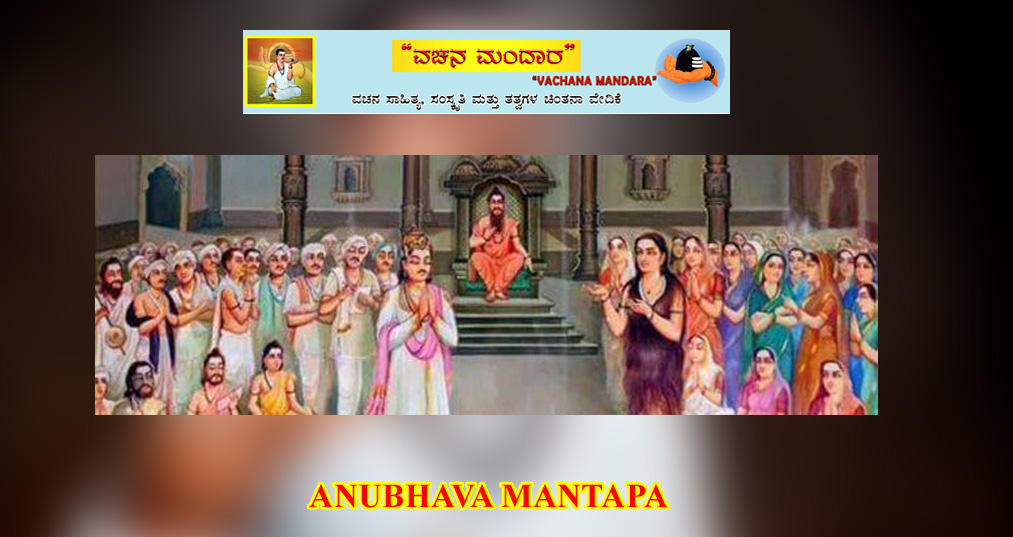
World’s First Socio-Religious Parliament “Anubhava Mantapa”
With one of the Vachana written by Sharane Akkamma, a renowned Vachana poetess of 12th Century, let us understand the concept of Parliament system.
ಏಳುನೂರೆಪ್ಪತ್ತು | ಅಮರಗಣಂಗಳಿಗೆಲ್ಲಕ್ಕೂ ||
ತಮ್ಮ ತಮ್ಮ | ಭಾವದ ಶೀಲ ||
ಗಂಗೆವಾಳುಕ | ಸಮಾರುದ್ರರೆಲ್ಲಕ್ಕೂ ||
ತಮ್ಮ ತಮ್ಮ ಮನಕ್ಕೆ | ಸಂದ ಸಂದ ನೇಮ ||
ಮರ್ತ್ಯಕ್ಕೆ ಬಂದ | ಪ್ರಮಥರೆಲ್ಲರೂ ||
ತಾವು ಬಂದುದನರಿದು | ಮುಂದಿನ ||
ಪಯಣಕ್ಕೆ | ಎಂದೆಂಬುದ ಕಂಡು ||
ಬಸವಣ್ಣನ ಮಣಿಹ | ಎಂದಿಂಗೆ ಸೆಲೆ ಸಂದು ||
ನಿಂದಿಹ | ವೇಳೆಯನರಿವನ್ನಕ್ಕ ||
ತಾವು ಕೊಂಡ ವೃತದಲ್ಲಿ | ಭಯ ಭಂಗವಿಲ್ಲದೆ ||
ನಿಂದಿರಬೇಕು ಆಚಾರವೇ | ಪ್ರಾಣವಾದ ||
ರಾಮೇಶ್ವರಲಿಂಗ | ದೊಳಗಹನ್ನಕ್ಕ ||
(ಸಮಗ್ರ ವಚನ ಸಂಪುಟ: ಒಂದು-2016 / ಪುಟ ಸಂಖ್ಯೆ-835 / ವಚನ ಸಂಖ್ಯೆ-459)
Transliteration:
Ella nureppattu | amaraganangaligellakku ||
Tamma tamma | bhavada sheela ||
Gangevaluka | samarudrarellakku ||
Tamma tamma manakke | sanda sanda nema ||
Martyakke banda | pramatharellaru ||
Tavu bandudanaridu | mundina ||
Payanakke | endembuda kandu ||
Basavannana maniha | endinge sele sandu ||
Nindiha | veleyanarivannakka ||
Tavu konda vrutadalli | bhaya bhangavillade ||
Nindirabeku acharave | pranavada ||
Rameshwaralinga | dolagahannakka ||
Translation:
All the 770 front line devotees who were there in Anubhava Mantapa (Socio-Religious Parliament in 12th Century) have their own role to play meticulously. Coming together and assembling together for a good cause, like sand on the banks of river Ganga, have to perform their duties and responsibilities towards the good cause for the society. Under the leadership of Basavanna we need to perform our duty in time and achieve specified goal. While executing this honored duty we need not to bow our head either with fear or consequences. Such service will be blessed by God (Rameshwaralinga).
This Vachana or a poem gives us the message of assembling at one place to discuss the good cause for which we have come to this world. As we go through this Vachana, there is a mention of 770 Amara Ganangal. Let us understand the significance 770 Amara Ganangal.
Anubhava Mantapa which was the biggest Socio-Religious parliament under the Sun even today. There were 770 Sharanas representing in the Anubhava Mantapa, including women. These representatives were called “Amara Ganangal”. Amara Ganangal are the representatives from all classes of the society. Very important to note that 35% of the members were Women in Anubhava Mantapa. In the medieval ancient history, the history of dark age:
- The world never thought of democracy.
- The world never thought of rise of untouchables.
- The rise of suffering masses.
- The whole world ignored women equality or gender equality.
When the whole world was not thought of democracy, Basaveshwara brought democracy in the society and stood by it. The principal democracy was implemented by great visionary Basaveshwara during 12th century.
Basaveshwara did not rely on Sanskrit language for bringing about the desired religious awakening among the people, because it was the language of an elite class then. The common people, especially the lower sections of society, did not have the privilege of studying Sanskrit. Basaveshwara spoke in the Kannada language that ordinary people could understand. His mission was to take religion to the doors of the common man. Hence, he used the language of common man. The same way, Buddha had used the common language (Pali) of his times. He consciously avoided the use of Sanskrit, except those that had naturalized themselves in the lingua franca (Communication Language). Basaveshwara preached and wrote in Kannada, the language of the masses of his times.
UNIVERSAL DECLARATION OF HUMAN RIGHTS:
After the World War-II, it became very important to give Freedom, Justice and Peace across the Globe. We can achieve the same by recognition of the dignity, equal and absolute rights of all lives in the world. Every life born in this universe has every privilege to get Food, Safety and Shelter. To achieve various rights of individuals, United Nations promoted “Universal Declaration of Human Rights”. There are 30 articles proclaimed to as a common standard of achieving the peoples Freedom, Justice and Peace across the Globe.
Article 1: All human beings are born free and equal in dignity and rights. They are endowed with reason and conscience and should act towards one another in a spirit of brotherhood.
Article 2: Everyone is entitled to all the rights and freedoms set forth in this Declaration, without distinction of any kind, such as race, color, sex, language, religion, political or other opinion, national or social origin, property, birth or other status. Furthermore, no distinction shall be made on the basis of the political, jurisdictional or international status of the country or territory to which a person belongs, whether it be independent, trust, non-self-governing or under any other limitation of sovereignty.
Article 3: Everyone has the right to life, liberty and security of person.
Article 4: No one shall be held in slavery or servitude; slavery and the slave trade shall be prohibited in all their forms.
Article 5: No one shall be subjected to torture or to cruel, inhuman or degrading treatment or punishment.
Article 6: Everyone has the right to recognition everywhere as a person before the law.
Article 7: All are equal before the law and are entitled without any discrimination to equal protection of the law. All are entitled to equal protection against any discrimination in violation of this Declaration and against any incitement to such discrimination.
Article 8: Everyone has the right to an effective remedy by the competent national tribunals for acts violating the fundamental rights granted him by the constitution or by law.
Article 9: No one shall be subjected to arbitrary arrest, detention or exile.
Article 10: Everyone is entitled in full equality to a fair and public hearing by an independent and impartial tribunal, in the determination of his rights and obligations and of any criminal charge against him.
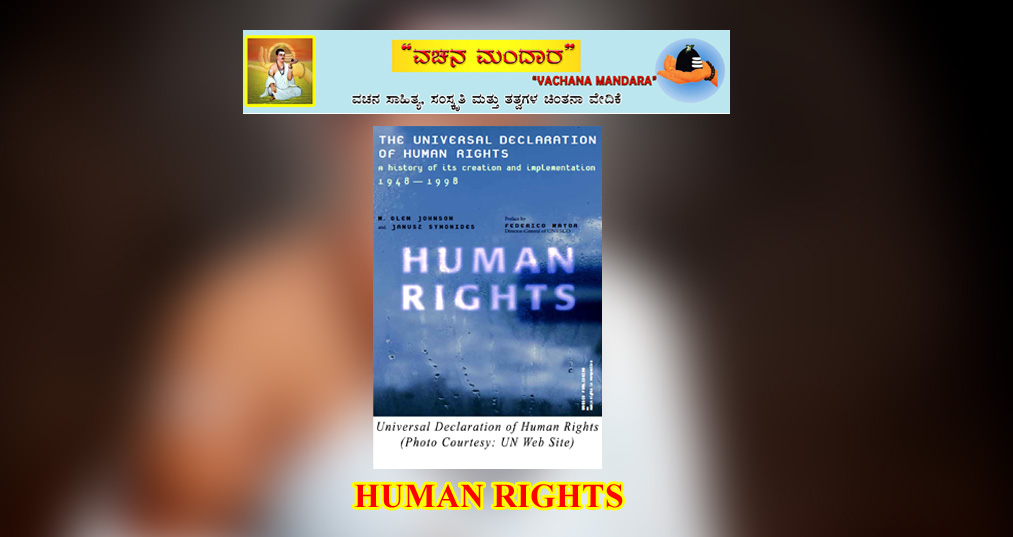
Article 11:
1. Everyone charged with a penal offence has the right to be presumed innocent until proved guilty according to law in a public trial at which he has had all the guarantees necessary for his defense.
2. No one shall be held guilty of any penal offence on account of any act or omission which did not constitute a penal offence, under national or international law, at the time when it was committed. Nor shall a heavier penalty be imposed than the one that was applicable at the time the penal offence was committed.
Article 12: No one shall be subjected to arbitrary interference with his privacy, family, home or correspondence, nor to attacks upon his honor and reputation. Everyone has the right to the protection of the law against such interference or attacks.
Article 13:
1. Everyone has the right to freedom of movement and residence within the borders of each State.
2. Everyone has the right to leave any country, including his own, and to return to his country.
Article 14:
1. Everyone has the right to seek and to enjoy in other countries asylum from persecution.
2. This right may not be invoked in the case of prosecutions genuinely arising from non-political crimes or from acts contrary to the purposes and principles of the United Nations.
Article 15:
1. Everyone has the right to a nationality.
2. No one shall be arbitrarily deprived of his nationality nor denied the right to change his nationality.
Article 16:
1. Men and women of full age, without any limitation due to race, nationality or religion, have the right to marry and to found a family. They are entitled to equal rights as to marriage, during marriage and at its dissolution.
2. Marriage shall be entered into only with the free and full consent of the intending spouses.
3. The family is the natural and fundamental group unit of society and is entitled to protection by society and the State.
Article 17:
1. Everyone has the right to own property alone as well as in association with others.
2. No one shall be arbitrarily deprived of his property.
Article 18: Everyone has the right to freedom of thought, conscience and religion; this right includes freedom to change his religion or belief, and freedom, either alone or in community with others and in public or private, to manifest his religion or belief in teaching, practice, worship and observance.
Article 19: Everyone has the right to freedom of opinion and expression; this right includes freedom to hold opinions without interference and to seek, receive and impart information and ideas through any media and regardless of frontiers.
Article 20:
1. Everyone has the right to freedom of peaceful assembly and association.
2. No one may be compelled to belong to an association.
Article 21:
1. Everyone has the right to take part in the government of his country, directly or through freely chosen representatives.
2. Everyone has the right of equal access to public service in his country.
3. The will of the people shall be the basis of the authority of government; this will shall be expressed in periodic and genuine elections which shall be by universal and equal suffrage and shall be held by secret vote or by equivalent free voting procedures.
Article 22: Everyone, as a member of society, has the right to social security and is entitled to realization, through national effort and international co-operation and in accordance with the organization and resources of each State, of the economic, social and cultural rights indispensable for his dignity and the free development of his personality.
Article 23:
1. Everyone has the right to work, to free choice of employment, to just and favorable conditions of work and to protection against unemployment.
2. Everyone, without any discrimination, has the right to equal pay for equal work.
3. Everyone who works has the right to just and favourable remuneration ensuring for himself and his family an existence worthy of human dignity, and supplemented, if necessary, by other means of social protection.
4. Everyone has the right to form and to join trade unions for the protection of his interests.
Article 24: Everyone has the right to rest and leisure, including reasonable limitation of working hours and periodic holidays with pay.
Article 25
1. Everyone has the right to a standard of living adequate for the health and wellbeing of himself and of his family, including food, clothing, housing and medical care and necessary social services, and the right to security in the event of unemployment, sickness, disability, widowhood, old age or other lack of livelihood in circumstances beyond his control.
2. Motherhood and childhood are entitled to special care and assistance. All children, whether born in or out of wedlock, shall enjoy the same social protection.
Article 26:
1. Everyone has the right to education. Education shall be free, at least in the elementary and fundamental stages. Elementary education shall be compulsory. Technical and professional education shall be made generally available and higher education shall be equally accessible to all on the basis of merit.
2. Education shall be directed to the full development of the human personality and to the strengthening of respect for human rights and fundamental freedoms. It shall promote understanding, tolerance and friendship among all nations, racial or religious groups, and shall further the activities of the United Nations for the maintenance of peace.
3. Parents have a prior right to choose the kind of education that shall be given to their children.
Article 27:
1. Everyone has the right freely to participate in the cultural life of the community, to enjoy the arts and to share in scientific advancement and its benefits.
2. Everyone has the right to the protection of the moral and material interests resulting from any scientific, literary or artistic production of which he is the author.
Article 28: Everyone is entitled to a social and international order in which the rights and freedoms set forth in this Declaration can be fully realized.
Article 29:
1. Everyone has duties to the community in which alone the free and full development of his personality is possible.
2. In the exercise of his rights and freedoms, everyone shall be subject only to such limitations as are determined by law solely for the purpose of securing due recognition and respect for the rights and freedoms of others and of meeting the just requirements of morality, public order and the general welfare in a democratic society.
3. These rights and freedoms may in no case be exercised contrary to the purposes and principles of the United Nations.
Article 30: Nothing in this Declaration may be interpreted as implying for any State, group or person any right to engage in any activity or to perform any act aimed at the destruction of any of the rights and freedoms set forth herein.
Probably no other document of any kind, certainly no other statement of human rights, has ever been debated so extensively and intensively by such a diverse group of people representing such varied cultures and backgrounds. It was a remarkable achievement merely to have reached such wide agreement on such a text. But, the delegates and the peoples they represented were interested not only in reaching agreement on a text but in strengthening the resources available to those struggling to assert their human rights.
FUNDAMENTAL RIGHTS & ARTICLES IN CONSTITUTION OF INDIA:
The constitution of India, influenced by some of the rights and articles from constitutions of various countries.
- Constitution of United Kingdom: Parliamentary System, Citizenship, Collective responsibilities of Council of Ministers, Scope and range of power of Rit, Responsibilities of Speaker, Administration and Law.
- Constitution of Ireland: Nomination and Election of President, Directions to the States.
- Constitution of America: Fundamental Rights, Review of Legal System, Proposals, functions of Vice President.
- Constitution of Canada: Appointment of Governors and Powers of Union Government.
- Constitution of Australia: Sessions of Parliament.
- Constitution of South Africa: Amendments of Constitution, Election to the members of Rajya Sabha.
- Constitution of Germany: Emergency.
- Constitution of Russia: Fundamental duties, Political, Social and Legal scopes and instruments.
- Constitution of France: Republic, Independence, Equality, Brotherhood.
- Constitution of Japan: Frame work to build Legal System.
The 3rd Chapter in the constitution, articles from 14 to 35 and 51A deals with the fundamental rights.
- Article 14 – Equality before law: The State shall not deny to any person equality before the law or the equal protection of the laws within the territory of India.
- Article 15 – Prohibition of discrimination on grounds of religion, race, caste, sex or place of birth.
- Article 16 – Equality of opportunity in matters of public employment: There shall be equality of opportunity for all citizens in matters relating to employment or appointment to any office under the State.
- Article 17 – Abolition of Untouchability: “Untouchability” is abolished and its practice in any form is forbidden. The enforcement of any disability arising out of “Untouchability” shall be an offence punishable in accordance with law.
- Article 18 – Abolition of titles: No title, not being a military or academic distinction, shall be conferred by the State.
- Article 19 – Protection of certain rights regarding freedom of speech: All citizens shall have the right
(a) to freedom of speech and expression.
(b) to assemble peaceably and without arms.
(c) to form associations or unions, co-operative societies.
(d) to move freely throughout the territory of India.
(e) to reside and settle in any part of the territory of India.
(g) to practice any profession, or to carry on any occupation, trade or business.
- Article 20 – Protection in respect of conviction for offences: No person shall be convicted of any offence except for violation of a law in force at the time of the commission of the Act charged as an offence, nor be subjected to a penalty greater than that which might have been inflicted under the law in force at the time of the commission of the offence.
- Article 21 – Protection of life and personal liberty: No person shall be deprived of his life or personal liberty except according to procedure established by law.
- Article 21A – Right to education: The State shall provide free and compulsory education to all children of the age of six to fourteen years in such manner as the State may, by law, determine.
- Article 22 – Protection against arrest and detention in certain cases: No person who is arrested shall be detained in custody without being informed, as soon as may be, of the grounds for such arrest nor shall he be denied the right to consult, and to be defended by, a legal practitioner of his choice.
- Article 23, Right against Exploitation – Prohibition of traffic in human beings and forced labor.
- Article 24, Right against Exploitation – Prohibition of employment of children in factories, etc.
- Article 25, Right to Freedom of Religion – Freedom of conscience and free profession, practice and propagation of religion: Subject to public order, morality and health and to the other provisions of this Part, all persons are equally entitled to freedom of conscience and the right freely to profess, practice and propagate religion.
- Article 26, Right to Freedom of Religion – Freedom to manage religious affairs: Subject to public order, morality and health, every religious denomination or any section thereof shall have the right
to establish and maintain institutions for religious and charitable purposes
(b) to manage its own affairs in matters of religion;
(c) to own and acquire movable and immovable property; and
(d) to administer such property in accordance with law.
- Article 27, Right to Freedom of Religion – Freedom as to payment of taxes for promotion of any particular religion: No person shall be compelled to pay any taxes, the proceeds of which are specifically appropriated in payment of expenses for the promotion or maintenance of any particular religion or religious denomination.
- Article 28, Right to Freedom of Religion – Freedom as to attendance at religious instruction or religious worship in certain educational institutions: No religious instruction shall be provided in any educational institution wholly maintained out of State funds.
- Article 29, Cultural and Educational Rights – Protection of interests of minorities: Any section of the citizens residing in the territory of India or any part thereof having a distinct language, script or culture of its own shall have the right to conserve the same.
- Article 30, Cultural and Educational Rights – Right of minorities to establish and administer educational institutions: All minorities, whether based on religion or language, shall have the right to establish and administer educational institutions of their choice.
- Article 32, Right to Constitutional Remedies – Remedies for enforcement of rights conferred by this part: The right to move the Supreme Court by appropriate proceedings for the enforcement of the rights conferred by this Part is guaranteed.
- Article 33, Right to Constitutional Remedies – Power of Parliament to modify the rights conferred by this Part in their application to Forces, etc.: Parliament may, by law, determine to what extent any of the rights conferred by this Part.
- Article 34, Right to Constitutional Remedies – Restriction on rights conferred by this Part while martial law is in force in any area: Notwithstanding anything in the foregoing provisions of this Part, Parliament may by law indemnify any person in the service of the Union or of a State or any other person in respect of any act done by him in connection with the maintenance or restoration of order in any area within the territory of India where martial law was in force or validate any sentence passed, punishment inflicted, forfeiture ordered or other act done under martial law in such area.
- Article 35, Right to Constitutional Remedies – Legislation to give effect to the provisions of this Part: Notwithstanding anything in this Constitution, Parliament shall have, and the Legislature of a State shall not have, power to make laws.
- Article 51A, Fundamental Duties – It shall be the duty of every citizen of India,
- (a) to abide by the Constitution and respect its ideals and institutions, the National Flag and the National Anthem.
(b) to cherish and follow the noble ideals which inspired our national struggle for freedom.
(c) to uphold and protect the sovereignty, unity and integrity of India.
(d) to defend the country and render national service when called upon to do so.
(e) to promote harmony and the spirit of common brotherhood amongst all the people of India transcending religious, linguistic and regional or sectional diversities; to renounce practices derogatory to the dignity of women.
(f) to value and preserve the rich heritage of our composite culture.
(g) to protect and improve the natural environment including forests, lakes, rivers and wild life, and to have compassion for living creatures.
(h) to develop the scientific temper, humanism and the spirit of inquiry and refor
(i) to safeguard public property and to abjure violence.
(j) to strive towards excellence in all spheres of individual and collective activity so that the nation constantly rises to higher levels of endeavor and achievement
.(k) who is a parent or guardian to provide opportunities for education to his child or, as the case may be, ward between the age of six and fourteen years.
ANALOGY OF FUNDAMENTAL RIGHTS:
UNIVERSAL DECLARATION OF HUMAN RIGHTS, ARTICLES IN CONSTITUTION OF INDIA, AND VACHANA LITERATURE:
Basaveshwara Philosophy has much more theories than the rights and responsibilities accounted in the Constitution of India. The architect of Indian Constitution Dr. B R Ambedkar once said,
If I had known the preaching’s and tenets of Basaveshwara much before articulating the constitution, the nature of the present constitution would have been much better.
The constitution of India and United Nation’s Declaration of Human Rights have the similar messages regarding human values. It is said that, Magna Carta has a great influence in documenting the Constitution of many Countries and United Nations Declaration of Human Rights. Magna Carta is documented in 13th Century.
The values and characteristics presented in Magna Carta are also said and written in Vachana Literature in 12th Century. This article, is an effort to analyze the similarities between Constitution of India and United Nations Declaration of Human Rights and Vachana Literature. We will examine all the articles one by one and relate it to Vachana Literature, so that we can have the comparative study.
EQUALITY & DIGNITY:
UN Declaration of Human Rights, Article 1:
All human beings are born free and equal in dignity and rights. They are endowed with reason and conscience and should act towards one another in a spirit of brotherhood.
UN Declaration of Human Rights, Article 2: Everyone is entitled to all the rights and freedoms set forth in this Declaration, without distinction of any kind, such as race, color, sex, language, religion, political or other opinion, national or social origin, property, birth or other status. Furthermore, no distinction shall be made on the basis of the political, jurisdictional or international status of the country or territory to which a person belongs, whether it be independent, trust, non-self-governing or under any other limitation of sovereignty.
UN Declaration of Human Rights, Article 3: Everyone has the right to life, liberty and security of person.
UN Declaration of Human Rights, Article 4: No one shall be held in slavery or servitude; slavery and the slave trade shall be prohibited in all their forms.
UN Declaration of Human Rights, Article 5: No one shall be subjected to torture or to cruel, inhuman or degrading treatment or punishment.
UN Declaration of Human Rights, Article 6: Everyone has the right to recognition everywhere as a person before the law.
UN Declaration of Human Rights, Article 7: All are equal before the law and are entitled without any discrimination to equal protection of the law. All are entitled to equal protection against any discrimination in violation of this Declaration and against any incitement to such discrimination.
UN Declaration of Human Rights, Article 8: Everyone has the right to an effective remedy by the competent national tribunals for acts violating the fundamental rights granted him by the constitution or by law.
UN Declaration of Human Rights, Article 9: No one shall be subjected to arbitrary arrest, detention or exile.
UN Declaration of Human Rights, Article 10: Everyone is entitled in full equality to a fair and public hearing by an independent and impartial tribunal, in the determination of his rights and obligations and of any criminal charge against him.
CONSTITUTION OF INDIA, Article 14 – Equality before law: The State shall not deny to any person equality before the law or the equal protection of the laws within the territory of India.
CONSTITUTION OF INDIA, Article 15 – Prohibition of discrimination on grounds of religion, race, caste, sex or place of birth.
CONSTITUTION OF INDIA, Article 16 – Equality of opportunity in matters of public employment: There shall be equality of opportunity for all citizens in matters relating to employment or appointment to any office under the State.
CONSTITUTION OF INDIA, Article 17 – Abolition of Untouchability: “Untouchability” is abolished and its practice in any form is forbidden. The enforcement of any disability arising out of “Untouchability” shall be an offence punishable in accordance with law.
There are innumerable theories in the society, which plays important role in human resource and personality development. This is due to the fact that society is divided by the ladder system based on Religion, Caste, Class, Work Culture, Financial status and many more. Basaveshwara and Sharanas laid their life span in providing equality in society and they were very successful in creating an egalitarian society in 12th Century.
Basaveshwara right from his childhood advocated for equality. His vision and mission of equality is very strong and vibrant. One of his Vachana gives a clear message.
ಎನ್ನಿಂದ ಕಿರಿಯರಿಲ್ಲ | ಶಿವಭಕ್ತರಿಗಿಂತ ಹಿರಿಯರಿಲ್ಲ ||
ನಿಮ್ಮ ಪಾದ ಸಾಕ್ಷಿ | ಎನ್ನ ಮನ ಸಾಕ್ಷಿ ||
ಕೂಡಲಸಂಗಮದೇವಾ | ಎನಗಿದೆ ದಿಬ್ಯ ||
(ಸಮಗ್ರ ವಚನ ಸಂಪುಟ: ಒಂದು-2016 / ಪುಟ ಸಂಖ್ಯೆ-35 / ವಚನ ಸಂಖ್ಯೆ-335)
Transliteration:
Enninda kiriyarilla | Shivabhaktariginta hiriyarilla ||
Nimma pada sakshi | enna mana sakshi ||
Kudalasangamadeva | enagide dibya ||
Translation:
There is none younger than me. None superior than devotees of Shiva.
I swear on your feet, I swear on my mind.
Kudalasangamadeva this itself is my oath.
Meaning:
Here Basaveshwara sets classic example to be as humble as possible. He says, I am the youngest of all and there are no superior other than Sharanas. He says this commitment and conviction by swearing on the feet of his Lord Kudalasangamadeva. He also affirms to be a humble man with his inner consciousness as well. He pledged to maintain the same code of conduct throughout his life by taking oath.
His single statement, no one is inferior to me and no one is superior than the devotees of Shiva (Enninda kiriyarilla Shivabhaktarigintha hiriyarilla i.e., There is none younger than me, none superior than devotees of Shiva) shows his concern for equality. His basic vision, mission and intension was to establish egalitarian society through code of conduct.
Basaveshwara’s another Vachana describes the fundamental principle of equality in the society.
ಇವನಾರವ ಇವನಾರವ | ಇವ ನಾರವನೆಂದೆನಿಸದಿರಯ್ಯಾ ||
ಇವ ನಮ್ಮವ ಇವ ನಮ್ಮವ | ಇವ ನಮ್ಮವನೆಂದೆನಿಸಯ್ಯಾ ||
ಕೂಡಲಸಂಗಮದೇವಾ | ನಿಮ್ಮ ಮನೆಯ ಮಗನೆಂದೆನಿಸಯ್ಯಾ ||
(ಸಮಗ್ರ ವಚನ ಸಂಪುಟ: ಒಂದು-2016 / ಪುಟ ಸಂಖ್ಯೆ-16 / ವಚನ ಸಂಖ್ಯೆ-62)
Transliteration:
Ivanarava ivanarava | ivanaravanendenisdirayya ||
Iva nammava iva nammava | iva nammavanendenisayya ||
Kudalasangamadeva | nimma maneya maganedanisayya ||
Transliteration:
Let them not say, who is He who is He who is He
Rather, let them say He is ours He is ours He is ours.
O Lord Kudalasangamadeva, let me be a son of their house.
Meaning:
Basaveshwara requests to treat him as their family member. Thereby creating the society as one family.
With this Vachana, Basaveshwara gives a message to create equality in the society by attaching himself to the Philosophy of One world one family (Vasudhaiva Kutumbakam). Here Basaveshwara, emphasized on lifting the oppressed class of the society, who were exploited from the upper caste people of caste-based ladder System of the society. Basaveshwara, himself being a Brahmin from birth and Prime Minister in the Bijjala Empire has all the advantages of having a colorful and comfortable life. But he dedicated his life to bring equality in the society. Look at the last line, which gives a great message; treat me as your own son, show that he wants to be associated with them as their family member.
Another Vachana of Basaveshwara, clearly indicates how committed to the culture of equality in the society.
ಅಪ್ಪನು ನಮ್ಮ | ಮಾದಾರ ಚೆನ್ನಯ್ಯ ||
ಬೊಪ್ಪನು ನಮ್ಮ | ಡೋಹಾರ ಕಕ್ಕಯ್ಯ ||
ಚಿಕ್ಕಯ್ಯನೆಮ್ಮಯ್ಯ | ಕಾಣಯ್ಯ ||
ಅಣ್ಣನು ನಮ್ಮ | ಕಿನ್ನರ ಬೊಮ್ಮಯ್ಯ ||
ಎನ್ನನೇತಕ್ಕರಿಯರಿ? | ಕೂಡಲಸಂಗಯ್ಯ ||
(ಸಮಗ್ರ ವಚನ ಸಂಪುಟ: ಒಂದು-2016 / ಪುಟ ಸಂಖ್ಯೆ-36 / ವಚನ ಸಂಖ್ಯೆ-349)
Transliteration:
Appanu namma | madara Chennayya ||
Boppanu namma | dohara Kakkayya ||
Chikkayyanemmayya | kanayya ||
Annanu namma | kinnari Bommayya ||
Ennanetakkariyari? | Kudalasangayya ||
Transliteration:
Bamboo professional Madara Channayya is my father.
Tanner Dohara Kakkayya is my father.
Sculptor Chikkayya is my brother.
Goldsmith Bommayya is my brother.
Why are you not recognizing me O Lord Kudalasangamadeva?
Meaning:
Here Basaveshwara says a bamboo professional Channayya is his father, a tanner Kakkayya is father, a sculptor Chikkanna is his brother, goldsmith Bommayya is his brother. By saying this Basaveshwara sets a milestone to be a part of society, whatever the caste may be to make the society egalitarian society. Basaveshwara also requests the people of the society as whole is his family.
The people who are being exploited are the low born people, like Madara Channayya, Dohara Kakkayya, Chikkayya, Kinnari Bommayya of the ladder system of society. Basaveshwara requests all of them to treat him as one of their family members. These statements from Basaveshwara removed the gaps of Caste and Class in the society, which created an egalitarian society.
Basaveshwara is the first thinker of the world who articulated the Gender Equality as well. Imagine the condition of the society in 12th Century where women were treated very badly and restricted only to kitchen.
Basaveshwara, unlike any other philosopher gave importance to women in his times. Basaveshwara persuaded women to attend and participate in the proceedings of the Anubhava Mantapa. More than 65 women members were there in the Anubhava Mantapa. Around 37 women wrote Vachanas. To name a few among them are Akka Mahadevi, Gangambike, Neelambike, Muktayakka, Kadire Remmevve, Kottanad Somavva, Sule Sankavve, Satyakka, Akkamma.
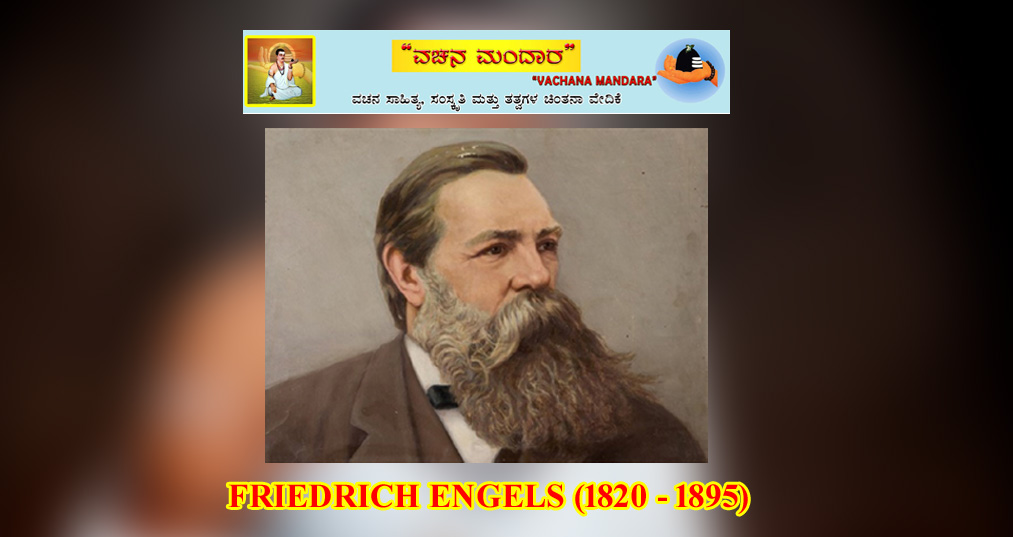
(Photo Courtesy: Internet)
A communist promoter, Friedrich Engels Says:
Basavanna advocated “Work is Worship”. By doing so, he exalted physical labor into a religious ideology and gave a severe blow to a society which looked down upon different professions since labor was fundamentally woven fabric of caste.
The revolution through devotion was carried out by Sharanas in 11th and 12th Century. The British Socialists J. S. Mill (1806-1873) and Jeremy Bentham (1748–1832) tried to create economic reforms through Social, Political and Religious tenets. The best example is Karl Marx (1818-1883) of Germany a powerful socialist thinker.
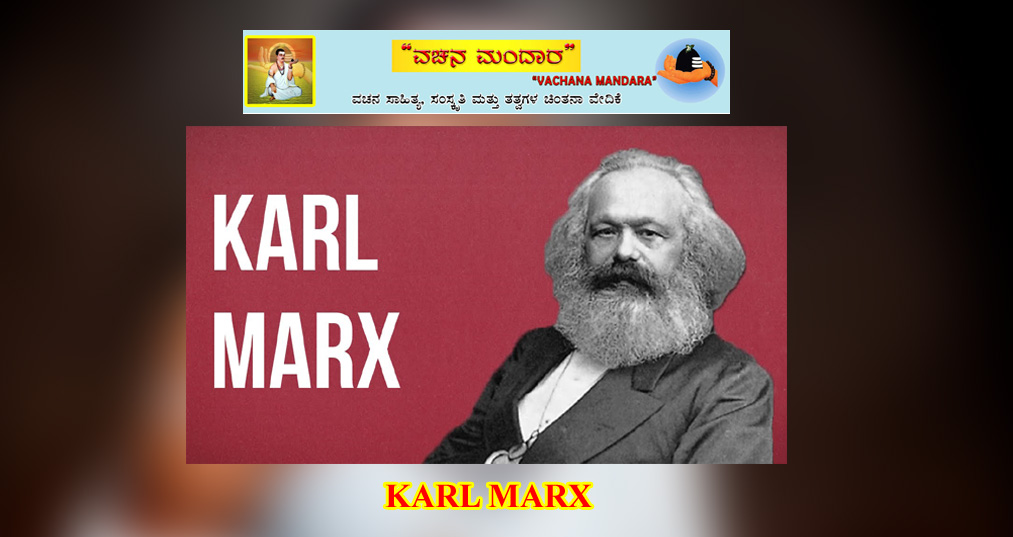
(Photo Courtesy: Internet)
Karl Marx in his writings praised Basaveshwara’s economic reforms:
It is no exaggeration to say that the message of Lord Basava is like a reservoir into which all previous thoughts flowed in from which all thought flowed out. Kind like Buddha, simple like Mahaveera, compassionate like Jesus, bold like Mohammed. Basava strikes us almost as a wonder of creation, but what attracts us most to him, are those teachings which he anticipated the greatest of the Modern Thinkers.
LAWS & SOCIAL BEHAVIOUR:
UN Declaration of Human Rights, Article 11:
1. Everyone charged with a penal offence has the right to be presumed innocent until proved guilty according to law in a public trial at which he has had all the guarantees necessary for his defense.
2. No one shall be held guilty of any penal offence on account of any act or omission which did not constitute a penal offence, under national or international law, at the time when it was committed. Nor shall a heavier penalty be imposed than the one that was applicable at the time the penal offence was committed.
UN Declaration of Human Rights, Article 12: No one shall be subjected to arbitrary interference with his privacy, family, home or correspondence, nor to attacks upon his honor and reputation. Everyone has the right to the protection of the law against such interference or attacks.
UN Declaration of Human Rights, Article 13:
1. Everyone has the right to freedom of movement and residence within the borders of each State.
2. Everyone has the right to leave any country, including his own, and to return to his country.
UN Declaration of Human Rights, Article 14:
1. Everyone has the right to seek and to enjoy in other countries asylum from persecution.
2. This right may not be invoked in the case of prosecutions genuinely arising from non-political crimes or from acts contrary to the purposes and principles of the United Nations.
UN Declaration of Human Rights, Article 15:
1. Everyone has the right to a nationality.
2. No one shall be arbitrarily deprived of his nationality nor denied the right to change his nationality.
CONSTITUTION OF INDIA, Article 18 – Abolition of titles: No title, not being a military or academic distinction, shall be conferred by the State.
CONSTITUTION OF INDIA, Article 19 – Protection of certain rights regarding freedom of speech: All citizens shall have the right
(a) to freedom of speech and expression.
(b) to assemble peaceably and without arms.
(c) to form associations or unions, co-operative societies.
(d) to move freely throughout the territory of India.
(e) to reside and settle in any part of the territory of India.
(g) to practice any profession, or to carry on any occupation, trade or business.
CONSTITUTION OF INDIA, Article 20 – Protection in respect of conviction for offences: No person shall be convicted of any offence except for violation of a law in force at the time of the commission of the Act charged as an offence, nor be subjected to a penalty greater than that which might have been inflicted under the law in force at the time of the commission of the offence.
CONSTITUTION OF INDIA, Article 21 – Protection of life and personal liberty: No person shall be deprived of his life or personal liberty except according to procedure established by law.
CONSTITUTION OF INDIA, Article 22 – Protection against arrest and detention in certain cases: No person who is arrested shall be detained in custody without being informed, as soon as may be, of the grounds for such arrest nor shall he be denied the right to consult, and to be defended by, a legal practitioner of his choice.
CONSTITUTION OF INDIA, Article 32, Right to Constitutional Remedies – Remedies for enforcement of rights conferred by this part: The right to move the Supreme Court by appropriate proceedings for the enforcement of the rights conferred by this Part is guaranteed.
CONSTITUTION OF INDIA, Article 33, Right to Constitutional Remedies – Power of Parliament to modify the rights conferred by this Part in their application to Forces, etc.: Parliament may, by law, determine to what extent any of the rights conferred by this Part.
CONSTITUTION OF INDIA, Article 34, Right to Constitutional Remedies – Restriction on rights conferred by this Part while martial law is in force in any area: Notwithstanding anything in the foregoing provisions of this Part, Parliament may by law indemnify any person in the service of the Union or of a State or any other person in respect of any act done by him in connection with the maintenance or restoration of order in any area within the territory of India where martial law was in force or validate any sentence passed, punishment inflicted, forfeiture ordered or other act done under martial law in such area.
CONSTITUTION OF INDIA, Article 35, Right to Constitutional Remedies – Legislation to give effect to the provisions of this Part: Notwithstanding anything in this Constitution, Parliament shall have, and the Legislature of a State shall not have, power to make laws.
CONSTITUTION OF INDIA, Article 51A, Fundamental Duties – It shall be the duty of every citizen of India,
(a) to abide by the Constitution and respect its ideals and institutions, the National Flag and the National Anthem.
(b) to cherish and follow the noble ideals which inspired our national struggle for freedom.
(c) to uphold and protect the sovereignty, unity and integrity of India.
(d) to defend the country and render national service when called upon to do so.
(e) to promote harmony and the spirit of common brotherhood amongst all the people of India transcending religious, linguistic and regional or sectional diversities; to renounce practices derogatory to the dignity of women.
(f) to value and preserve the rich heritage of our composite culture.
(g) to protect and improve the natural environment including forests, lakes, rivers and wild life, and to have compassion for living creatures.
(h) to develop the scientific temper, humanism and the spirit of inquiry and reform.
(i) to safeguard public property and to abjure violence.
(j) to strive towards excellence in all spheres of individual and collective activity so that the nation constantly rises to higher levels of endeavor and achievement.
(k) who is a parent or guardian to provide opportunities for education to his child or, as the case may be, ward between the age of six and fourteen years.
The above articles in UN Declaration of Human Rights and Constitution of India clearly pronounce the human rights should be protected by laws. Basaveshwara and his Sharanas themselves created the laws regarding how to protect themselves and the society as a whole. The “Ashtavarana (the eight boundaries or faith of how to enlighten our souls)”, five “Panchachara (five code of conducts of social behavior” and “Shatsthala (six stages of achieving the goal of highest embodiment, the union of body and soul)” are the principles or tenets of behaviors.
The rule of law presented in UN Human Rights and Constitution of India delivers the same message of considering the human being as a soul as long as his/her disobedience is proved. We can see the above laws and rules incorporated in Vachana Literature, with the bird’s eye view.
The Ashtavarana refer to the eight assets that act as shields or coverings protecting the devotee from extraneous distractions and influences of illusions. The term avarana is derived from the root or cover, which also means aid. Ashtameans ‘eight’ and avaranameans ‘covering or Compound’. They also protect against attachment to worldly desires, which will distract us to do unlawful acts. The Ashtavaranaare:
- Guru, Linga, Jangama
- Mantra, Vibhuti, Rudraksha
- Padodaka, Prasada
Among the Ashtavarana, Guru, Linga and Jangama are not solely human beings to be worshiped. Guru means his own conscious. Linga is considered to be the self or the culture and the Jangama is the valuable contribution to the society for the upliftment of the consciousness. Vibhuti is the indication of purity. It also means that the it is burnt ash of interest towards other Woman, Gold and Land in toto the illusion of the worldly matter. Mantra is the holy chanting of words which is the inner consciousness. Rudraksha is the thing one has to wear on the body. Rudraksha in spiritually it is the symbol of third eye of “MAHADEVA” or “SHIVA”. Here it can be interpreted as inner conscious, which plays as third eye. Lastly Padaodaka and Prasada are the outcome of worship and service. Padodaka is the outcome of the feeling of happiness and joy and Prasad is what we attain the extreme happiness or the enlightenment, which we feel and become complacent.
Panchachara is the code of moral and social conduct. Lingachara, Sadachara, Shivachara, Ganachara and Bhrityachara are the five Panchachara. 12th Century Sharanas have spread Panchachara with the view of controlling individual, religious and social life; of appealing people to behave as per the rules and regulations of society. “The Sharanas established Five Principles of Conduct to govern the life and behavior of individuals and their society as a whole and with the intention of making it conform to ideals of the society.
Let us see what the need of Panchachara is. Basically, the ordinary human beings in their daily living encounter the following three needs;
- Body needs food, sleep, and sheathing.
- Mind needs recreation, knowledge.
- Social needs including religious needs and security.
The first two, Lingachara, Sadachara, Body and Mind, associated with as an individual, and the third one, Shivachara, with as the member of the society. Ganachara and Bhrityachara are the needs of social needs that are loving and hating, giving and taking, submitting and dominating, and solitude and blending. Acceptance of God and close relationship with him invokes another type of need that is called religious needs. So Panchachara are the code of conduct to prevent the getting (satisfying) his human needs illegally or forcefully or by snatching or by killing/hurting other creatures in the world (society). Panchachara are intending to convey the principles of religion and religious conduct. The Panchachara have harmoniously blend the society. In these principles, we may notice that there is no room for complexity.
Lingachara teaches the disciple or the firm devotion in Istalinga. Sadachara insists him to lead a life of Satya Shuddha Kayaka and Dasoha. Shivachara teaches him to treat everyone as an equal. Ganachara ascribes him the mental strength to fight and struggle against the inward as well as outward flaws. And finally, Bhrityachara preaches to him to realize the fact that the society is certainly greater than an individual. Therefore, he should serve the society with fraternity and humanity. In this way, because of Panchachara, the life become strong and comprehensive from the points of view of society and morality.
The word Shatasthalais derived from ‘Shat’means six and ‘sthala’which means stage. The latter in the philosophical background means God. What is currently being practiced by passionate Lingayat’swas illustrated, advocated and organized some 900 years ago by the Sharanas. Shatasthala is a technical term meaning, is the complete source of all evolution and extraordinary presence into which all the things are finally absorbed. The beginning of the spiritual effort, there is a distinction between the worshipper and the worshipped (Anga and Linga). The distinction of the Anga and Linga gradually disappears until the Anga (individual self) becomes integrally united with the Linga (universal self). The six steps or stages of religious austerity and practices are the one has to pass before he can obtain God-realization. In every stage, Jeeva comes nearer to Shiva and joins Shiva at the last stage.
We are not immortal, we have not drunk nectar, we have not taken the elixir of life, this is our last chance for achieving salvation. Therefore, any stage should be a Shatsthala stage. In these words, Sharanas has given the following Shatsthala:
1. Bhakta Sthala (The stage of devotional worship).
2. Mahesha Sthal (The stage of ordeals and temptations).
3. Prasaadi Sthala (Lord’s presence in all aspects of life).
4. Pranalingi Sthala (The cleansing of the inner consciousness).
5. Sharana Sthala (A stage of self-enlightenment).
6. Aikya Sthala (The dissolution of the self in the God).
The following Vachana of Basaveshwara gives a beautiful and summarizing explanation of Shatsthala:
ಮೆಲ್ಲಮೆಲ್ಲನೆ | ಭಕ್ತನೆನೆಸಿಕೊಂಬೆ ||
ಮೆಲ್ಲಮೆಲ್ಲನೆ | ಮಾಹೇಶ್ವರನೆನಿಸಿಕೊಂಬೆ ||
ಮೆಲ್ಲಮೆಲ್ಲನೆ | ಪ್ರಸಾದಿ ಎನಿಸಿಕೊಂಬೆ ||
ಮೆಲ್ಲಮೆಲ್ಲನೆ | ಪ್ರಾಣಲಿಂಗಿ ಎನಿಸಿಕೊಂಬೆ ||
ಮೆಲ್ಲಮೆಲ್ಲನೆ | ಶರಣನೆನಿಸಿಕೊಂಬೆ ||
ಮೆಲ್ಲಮೆಲ್ಲನೆ | ಐಕ್ಯನೆನಿಸಿಕೊಂಬೆ ||
ಮೆಲ್ಲಮೆಲ್ಲನೆ | ಷಟ್ಸ್ಥಲವ ಮೀರಿ ||
ನಿರವಯಸ್ಥಲವನೆಯ್ದುವೆನಯ್ಯಾ | ಕೂಡಲಸಂಗಮದೇವಾ ||
(ಸಮಗ್ರ ವಚನ ಸಂಪುಟ: ಒಂದು-2016 / ಪುಟ ಸಂಖ್ಯೆ-121 / ವಚನ ಸಂಖ್ಯೆ-1318)
Transliteration:
Mella mellane | bhaktanenisikombe ||
Mella mellane | maheshwaranenisikombe ||
Mella mellane | prasadi enisikombe ||
Mella mellane | Pranalingi enisikombe ||
Mella mellane | sharananenisikombe ||
Mella mellane | aikyanenisikombe ||
Mella mellane | shatasthalava meeri ||
Niravasthalavaneyduvenayya | Kudalasangamadeva ||
Translation:
Slow and steadily | attain the stage of a devotee (Bhakta) ||
Slow and steadily | attain the stage of a ordeals (Mahesha) ||
Slow and steadily | attain the stage of fulfilment and presence of God everywhere (Prasadi) ||
Slow and steadily | attain the stage of a cleansing of the inner consciousness or the union of soul and body (Pranalingi) ||
Slow and steadily | attain the stage of self-enlightenment (Sharana) ||
Slow and steadily | attain the stage of dissolution of the self in the God or union of body and God (Aikya) ||
Slow and steadily | attain a stage of dissolution of the self in the God or self-enlightenment beyond six stages ||
O lord | Kudalasangamadeva ||
Meaning:
In the process of attaining the union of body and soul, we need to attain or fulfill the six stages meaning Shatsthala by name Bhakta, Mahesh, Prasadi, Pranalingi, Sharana, Aikya slowly and steadily. With the patience and perseverance Slow and steadily we can achieve and attain the stage of enlightenment beyond six stages.
Thus, Ashtavarana is the religious code of conduct, whereas Panchachara is the social and Shatsthala is the spiritual code of conduct. These have given specific direction to the religious, social and spiritual behavior of an individual. The building of society is based on the foundation of these three basic tenets. It is the essence of rules and regulations of the society. We can see and review that, on the same lines the articles of UN Human Rights and Constitution of India are laid down.
GENDER EQUALITY:
UN Declaration of Human Rights, Article 16:
1. Men and women of full age, without any limitation due to race, nationality or religion, have the right to marry and to found a family. They are entitled to equal rights as to marriage, during marriage and at its dissolution.
2. Marriage shall be entered into only with the free and full consent of the intending spouses.
3. The family is the natural and fundamental group unit of society and is entitled to protection by society and the State.
Let us understand more about gender equality through some of the research works and other references.
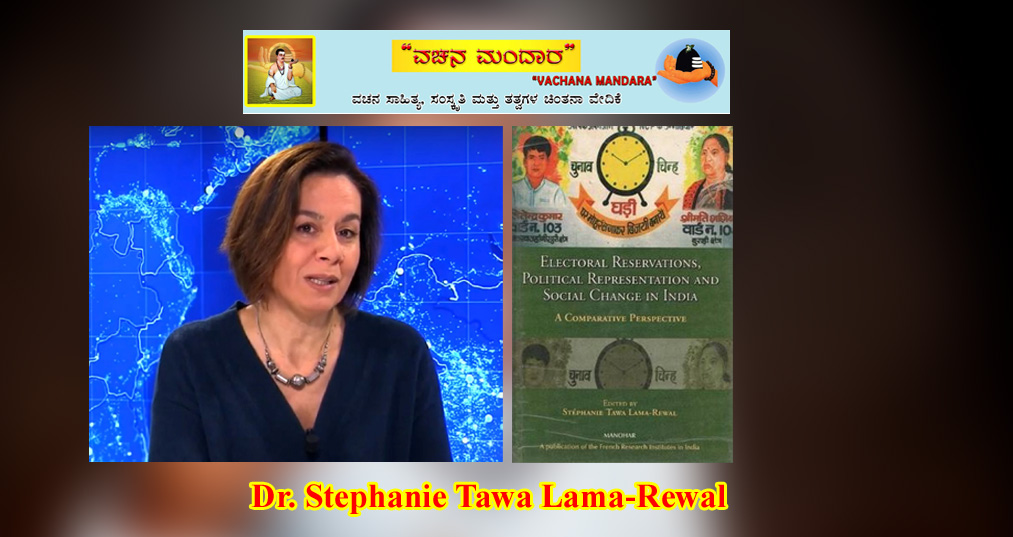
(Photo Courtesy: Internet)
Dr. Stephanie Tawa Lama-Rewal is a French woman and research fellow (political science) in the Centre for South Asian Studies (CNRS-EHESS), Paris. She studies the evolving forms of urban democracy in India, with a special interest in the relationship between political participation and political representation. Stephanie Tawa Lama-Rewal studies the contemporary functioning of Indian democracy through three main themes or dimensions: political representation (particularly that of women); participatory experiences; and urban governance.
In her research book “Electoral Reservations, Political Representation and Social Change in India” writes that, there is a different perspective for women in India and a woman as an object of reverence is the specialty of India. India the women were treated equal right from its civilization. At the “All India Depressed Classes Women’s Conference” held at Nagpur on 20th July, 1940, Dr. Babasaheb Ambedkar emphasized; There could not be any progress without participation of women. When we got independence, voting power was given without any debate. This is the beauty of gender equality in India.
As stated in UN Human Rights article, Women were given freedom of expression in 12th century at Anubhava Mantapa. Irrespective of caste, women were given gender equality, dignity and financial benefits. The Vachana of Basaveshwara clearly says all about the gender equality.
ಲಿಂಗವ ಪೂಜಿಸಿ | ಫಲವೇನಯ್ಯಾ ||
ಸಮರತಿ ಸಮಕಳೆ | ಸಮಸುಖವನರಿಯದನ್ನಕ್ಕ? ||
ಲಿಂಗವ ಪೂಜಿಸಿ | ಫಲವೇನಯ್ಯಾ ||
ಕೂಡಲಸಂಗಮದೇವರ | ಪೂಜಿಸಿ ||
ನದಿಯೊಳಗೆ ನದಿ | ಬೆರೆಸಿದಂತಾಗದನ್ನಕ್ಕ? ||
(ಸಮಗ್ರ ವಚನ ಸಂಪುಟ: ಒಂದು-2016 / ಪುಟ ಸಂಖ್ಯೆ-83 / ವಚನ ಸಂಖ್ಯೆ-930)
Transliteration:
Lingava poojisi | phalavenayya ||
Samarati samakale | samasukhavanariyadannakka ||
Lingava poojisi | phalavenayya ||
Kudalsangamadevara | poojisi ||
Nadiyolage nadi | beresidantagannakka ||
Translation:
No use of worshipping God, when you are not treating your wife, your siblings and your neighbors as equal to you.
No use of worshipping God, no use of worshipping Lord Kudalasangamadeva, when you are not mingling with the society like confluence of rivers.
Meaning:
Very simple narrative of equality, Basaveshwara gives through this Vachana. Every individual has to respect and treat his wife, his siblings and his neighbors as good as his own respect and honor. Then only we can achieve the egalitarian society.
PROPERTY RIGHTS:
UN Declaration of Human Rights, Article 17:
1. Everyone has the right to own property alone as well as in association with others.
2. No one shall be arbitrarily deprived of his property.
UN Declaration of Human Rights, Article 25
1. Everyone has the right to a standard of living adequate for the health and wellbeing of himself and of his family, including food, clothing, housing and medical care and necessary social services, and the right to security in the event of unemployment, sickness, disability, widowhood, old age or other lack of livelihood in circumstances beyond his control.
2. Motherhood and childhood are entitled to special care and assistance. All children, whether born in or out of wedlock, shall enjoy the same social protection.
CONSTITUTION OF INDIA, Article 26, Right to Freedom of Religion – Freedom to manage religious affairs: Subject to public order, morality and health, every religious denomination or any section thereof shall have the right
(a) to establish and maintain institutions for religious and charitable purposes
(b) to manage its own affairs in matters of religion;
(c) to own and acquire movable and immovable property; and
(d) to administer such property in accordance with law.
Equal distribution of wealth with a comprehensive economic system are the necessity of social justice. As stated in UN Human Rights article and Constitution of India, regarding the right to have the property, 12th Century mark the way for earning through Kayaka. Dasoha is the outcome of Kayaka. The aim & dream of Basaveshwara was to create hunger free society. For this to achieve Basaveshwara gave importance to 2 prominent tenets Kayaka (Work Culture) and Dasoha (Giving back to the society). There is no equivalent word for Kayaka in English. At best we can say Work. Basaveshwara defines Kayaka in a different sense. The definition of work which Basavanna gives is classic in the world of Vachana Literature.
Self-Responsibility : Responsibility to be safeguard yourself.
Family Responsibility : Responsibility to be safeguard your family.
Social Responsibility : Responsibility to be safeguard society and the surrounding nature.
12th Century Sharane Aydakki Lakkamma, we call her as “Ambassador of Work Doctrines” says meticulous work integrity and morality of earnings in her Vachanas. The following Vachana clearly narrates the to make a property through ethical way.
ಮನ ಶುದ್ಧವಿಲ್ಲದವಂಗೆ | ದ್ರವ್ಯದ ಬಡತನವಲ್ಲದೆ ||
ಚಿತ್ತಶುದ್ಧದಲ್ಲಿ | ಕಾಯಕವ ಮಾಡುವಲ್ಲಿ ||
ಸದ್ಭಕ್ತಂಗೆ ಎತ್ತ ನೋಡಿದತ್ತತ್ತ | ಲಕ್ಷ್ಮಿ ತಾನಾಗಿಪ್ಪಳು ||
ಮಾರಯ್ಯಪ್ರಿಯ ಅಮರೇಶ್ವರಲಿಂಗದ | ಸೇವೆಯುಳ್ಳನ್ನಕ್ಕರ ||
(ಸಮಗ್ರ ವಚನ ಸಂಪುಟ: ಒಂದು-2016 / ಪುಟ ಸಂಖ್ಯೆ-867 / ವಚನ ಸಂಖ್ಯೆ-724)
Transliteration:
Mana shuddhavilladavange | dravyada badatanavallade ||
Chitta shuddhadalli | kayakava maduvalli ||
Sadbhaktange etta nodidattatta | Lakshmi tanagippalu ||
Marayyapriya Amareshwaralingada | seveyullannakkara ||
Translation:
There is lack of money and resources, for those impure at mind and heart. Those who have the pure mind and heart, work with commitment and conviction, oh my supreme God (Marayyapriya Amareshwaralinga), Lakshmi, the Goddess of wealth is there everywhere for them.
Meaning:
This Vachana says all about work ethics. It is poverty for those people who are not executing work without conviction and commitment. If we work religiously and with discipline, money will flow from all over. We need to accept our work as the boon given by Lord Amareshwaralinga.
We need to understand that each and every individual is important and it is our duty to give respect to the everyone, as their work is very important for the growth of any country. This point is very well understood and manifested in 12th Century Vachana Literature.
Professionals in any country should have high morale with pure mind and heart, should exhibit Esprit de Corps-Morale. The high morality and work ethics was the tradition and culture of the 12th Century society. The Sharanas showed their high level of commitment and conviction to follow the “Holy Path” which means the positive attitude towards achieving the goals and objectives thereby having proper shelter in other words property.
FREEDOM OF RELIGION AND EXPRESSION:
UN Declaration of Human Rights, Article 18: Everyone has the right to freedom of thought, conscience and religion; this right includes freedom to change his religion or belief, and freedom, either alone or in community with others and in public or private, to manifest his religion or belief in teaching, practice, worship and observance.
UN Declaration of Human Rights, Article 19: Everyone has the right to freedom of opinion and expression; this right includes freedom to hold opinions without interference and to seek, receive and impart information and ideas through any media and regardless of frontiers.
UN Declaration of Human Rights, Article 20:
1. Everyone has the right to freedom of peaceful assembly and association.
2. No one may be compelled to belong to an association.
UN Declaration of Human Rights, Article 21:
1. Everyone has the right to take part in the government of his country, directly or through freely chosen representatives.
2. Everyone has the right of equal access to public service in his country.
3. The will of the people shall be the basis of the authority of government; this will shall be expressed in periodic and genuine elections which shall be by universal and equal suffrage and shall be held by secret vote or by equivalent free voting procedures.
UN Declaration of Human Rights, Article 22: Everyone, as a member of society, has the right to social security and is entitled to realization, through national effort and international co-operation and in accordance with the organization and resources of each State, of the economic, social and cultural rights indispensable for his dignity and the free development of his personality.
UN Declaration of Human Rights, Article 27:
1. Everyone has the right freely to participate in the cultural life of the community, to enjoy the arts and to share in scientific advancement and its benefits.
2. Everyone has the right to the protection of the moral and material interests resulting from any scientific, literary or artistic production of which he is the author.
UN Declaration of Human Rights, Article 28: Everyone is entitled to a social and international order in which the rights and freedoms set forth in this Declaration can be fully realized.
UN Declaration of Human Rights, Article 29:
1. Everyone has duties to the community in which alone the free and full development of his personality is possible.
2. In the exercise of his rights and freedoms, everyone shall be subject only to such limitations as are determined by law solely for the purpose of securing due recognition and respect for the rights and freedoms of others and of meeting the just requirements of morality, public order and the general welfare in a democratic society.
3. These rights and freedoms may in no case be exercised contrary to the purposes and principles of the United Nations.
CONSTITUTION OF INDIA, Article 25, Right to Freedom of Religion – Freedom of conscience and free profession, practice and propagation of religion: Subject to public order, morality and health and to the other provisions of this Part, all persons are equally entitled to freedom of conscience and the right freely to profess, practice and propagate religion.
CONSTITUTION OF INDIA, Article 27, Right to Freedom of Religion – Freedom as to payment of taxes for promotion of any particular religion: No person shall be compelled to pay any taxes, the proceeds of which are specifically appropriated in payment of expenses for the promotion or maintenance of any particular religion or religious denomination.
CONSTITUTION OF INDIA, Article 28, Right to Freedom of Religion – Freedom as to attendance at religious instruction or religious worship in certain educational institutions: No religious instruction shall be provided in any educational institution wholly maintained out of State funds.
CONSTITUTION OF INDIA, Article 30, Cultural and Educational Rights – Right of minorities to establish and administer educational institutions: All minorities, whether based on religion or language, shall have the right to establish and administer educational institutions of their choice.
Basaveshwara promoted “Anubhava Mantapa” where in people from all caste & communities, people from all economics status, including women participated to discuss day to day experiences. This was the efforts of social inclusiveness and implemented successfully in 12th Century itself. Basaveshwara was the driving force behind the religious revolution.
Basaveshwara written many Vachanas to demonstrate the right to religion and expressions in a profound way. One of his Vachana we quote here that says all about freedom of expression and we can see the same frequency of thought process in the following Vachana of Basaveshwara written in 12th Century.
ಲಿಂಗವಶದಿಂದ | ಬಂದ ನಡೆಗಳು ||
ಲಿಂಗವಶದಿಂದ | ಬಂದ ನುಡಿಗಳು ||
ಲಿಂಗವಂತರು | ತಾವು ಅಂಜಲದೇಕೆ? ||
ಲಿಂಗವಿರಿಸಿದಂತಿಪ್ಪುದಲ್ಲದೆ | ಕೂಡಲಸಂಗಮದೇವ ||
ಭಕ್ತರಭಿಮಾನ | ತನ್ನದೆಂಬನಾಗಿ ||
(ಸಮಗ್ರ ವಚನ ಸಂಪುಟ: ಒಂದು-2016 / ಪುಟ ಸಂಖ್ಯೆ-63 / ವಚನ ಸಂಖ್ಯೆ-685)
Transliteration:
Lingavashadinda | banda nadegalu ||
Lingavashadinda | banda nudigalu ||
Lingavantaru | tavu anjaladeke ||
Lingavirisidantippudallade | Kudalasangamadeva ||
Bhaktarabhimana | tannadembanagi ||
Translation:
Our behaviors come from culture.
What we speak comes from culture.
Why we mean to scare
Culture carries from our culture O Lord Kudalasangamadeva
Meaning:
Culture & traditions of speaking truth and faithfulness comes from culture we inherit. Then, why we should scare to be a cultured human being. By adding culture in our day today life even God (Kudalasangamadeva) will support in our accomplishments.
Recognition of the inherent dignity and of the equal and absolute rights of all members of the human family is the foundation of freedom, justice and peace in the world.
ದಯವಿಲ್ಲದ | ಧರ್ಮವದೇವುದಯ್ಯಾ? ||
ದಯವೇ ಬೇಕು | ಸರ್ವಪ್ರಾಣಿಗಳೆಲ್ಲರಲಿ ||
ದಯವೇ ಧರ್ಮದ | ಮೂಲವಯ್ಯಾ ||
ಕೂಡಲಸಂಗಯ್ಯ | ನಂತಲ್ಲದೊಲ್ಲನಯ್ಯಾ ||
(ಸಮಗ್ರ ವಚನ ಸಂಪುಟ: ಒಂದು-2016 / ಪುಟ ಸಂಖ್ಯೆ-29 / ವಚನ ಸಂಖ್ಯೆ-247)
Transliteration:
Dayavillada | dharmavadevidyya? ||
Dayave beku | sarvapranigalellarli ||
Dayave dharmada | mulavayya ||
Kudalasangayya | nantalladollanayya ||
Translation:
What sort of religion can it be without compassion?
Show compassion to all the living beings.
Compassion is the root of all religious faith.
Lord Kudalasangayya does not care for what is not like this.
Meaning:
Culture & traditions with out compassion are waste of time and space, as this Vachana narrates. We need to show compassion to all living beings wherever it required. Otherwise, the religion which do not practice this principle is not religion itself. Compassion and faithfulness come from culture we inherit. By adding compassion in our day today life even God (Kudalasangayya) will support in our accomplishments.
Basaveshwara and his teachings were hands-on and down-to-earth. The very purpose of religion is to well behavior which leads to a better life. Basaveshwara encouraged men and women to live a well-organized religious life with culture and compassion.
British author Aurthur miles wrote a book by name “The Land of Lingam” published in 1933, narrates about the Basaveshwara’s social reforms on the religious platform. In his book he says about Basaveshwara:
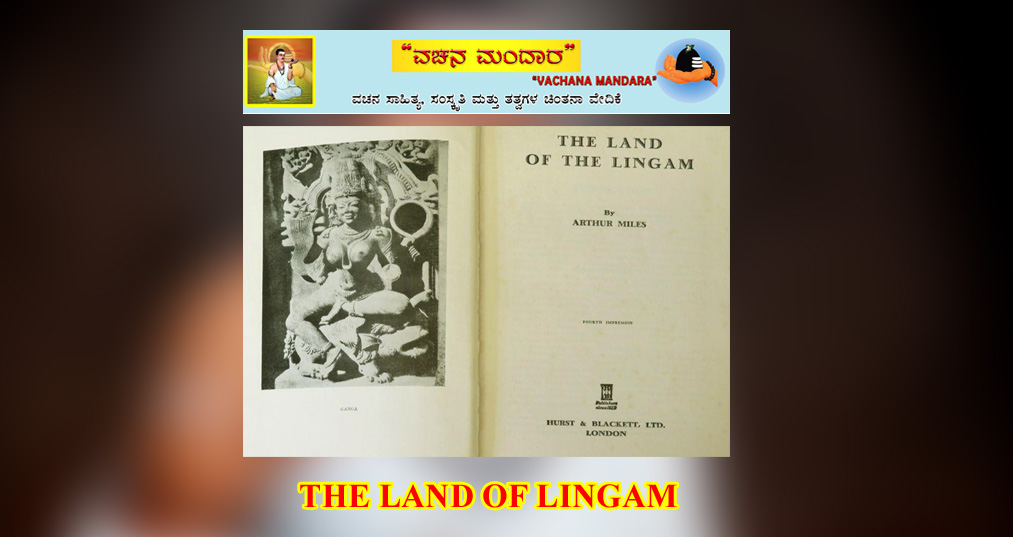
(Photo Courtesy: Internet)
THE LAND OF LINGAM written by ARTHUR MILES (Page-111):
Whatever legend may say of Basaveshwara; the fact is pretty clear that he was the “First Indian Free Thinker”. He might be called the “Luther of India”. The acknowledged leadership of the priests was in full swing when Basaveshwara came upon the scene, and there was a movement on foot to replace caste and priestly authority with intelligence and free thinking.
RIGHT TO WORK:
UN Declaration of Human Rights, Article 23:
1. Everyone has the right to work, to free choice of employment, to just and favorable conditions of work and to protection against unemployment.
2. Everyone, without any discrimination, has the right to equal pay for equal work.
3. Everyone who works has the right to just and favourable remuneration ensuring for himself and his family an existence worthy of human dignity, and supplemented, if necessary, by other means of social protection.
4. Everyone has the right to form and to join trade unions for the protection of his interests.
UN Declaration of Human Rights, Article 24: Everyone has the right to rest and leisure, including reasonable limitation of working hours and periodic holidays with pay.
CONSTITUTION OF INDIA, Article 23, Right against Exploitation – Prohibition of traffic in human beings and forced labor.
CONSTITUTION OF INDIA, Article 24, Right against Exploitation – Prohibition of employment of children in factories, etc.
To create a sound and equal society we need to have the philosophy of right to work. Work gives every opportunity to human beings to have the dignity and earn a livelihood by work freely by chosen or accepted area of work. The country must provide non-discrimination in relation to all aspects of culture of work ethics.
Louis Jean Joseph Charles Blanc (1811 –1882) was a French politician, historian and Socialist. he favored reforms and urged the govt to guarantee employment for the urban poor. Advocated the reforms with the associations of people who produced together and divided the profit accordingly. The term “The Right to Work” was first used by the French socialist leader Louis Blanc during the French Revolution of 1848. The right to work was to protect everybody to attain an adequate standard of living.
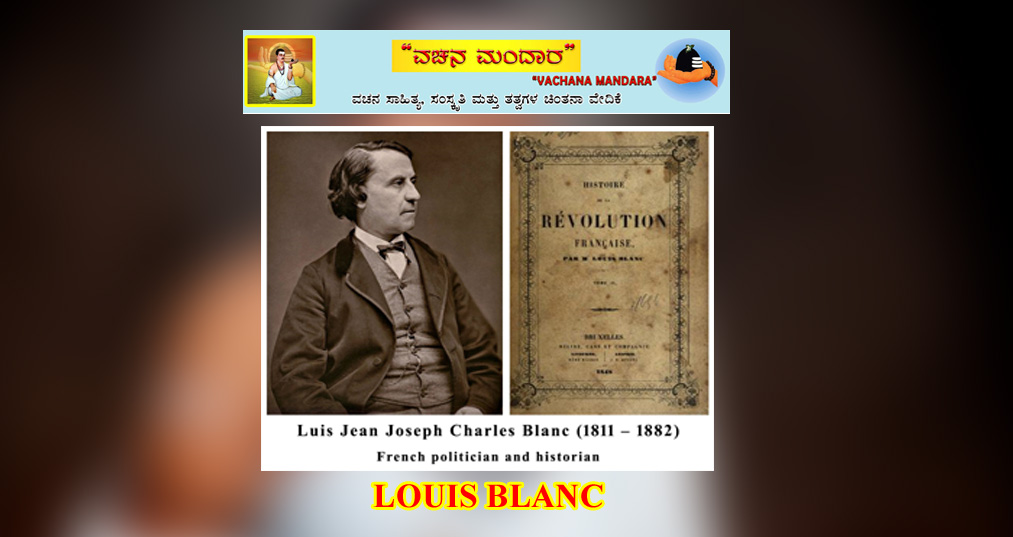
(Photo Courtesy: Internet)
Though the Right to Work is articulated right from 18th Century and in 20th Century UN promoted the human Rights, the idea of work is very well written in 12th Century Vachanas. The following Vachana of Sharane Aydakki Lakkamma, whom we know as the ambassador of work ethics, says about great importance to work.
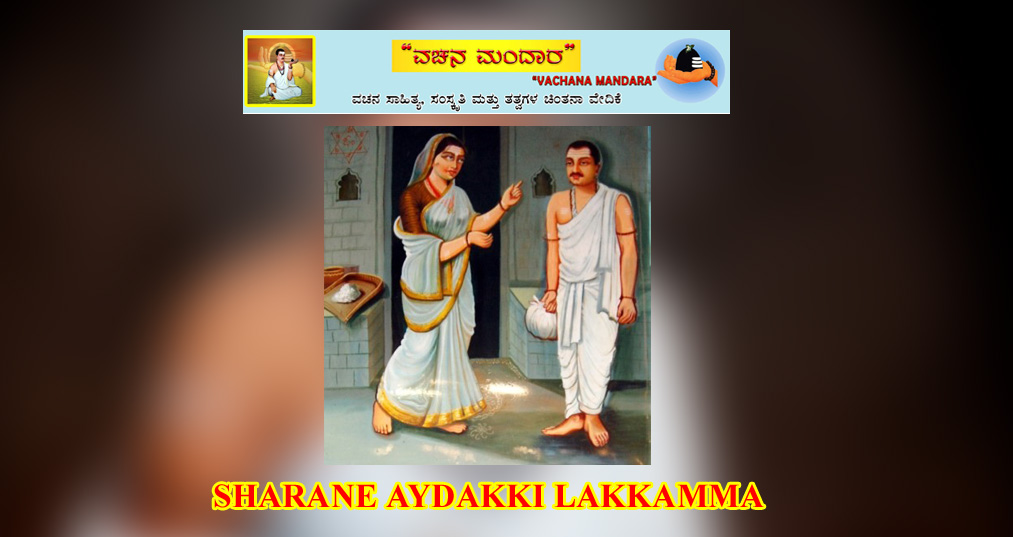
Aydakki Marayya & Lakkamma Couples (Photo Courtesy: Internet)
ಕಾಯಕ ನಿಂದಿತ್ತು | ಹೊಗಯ್ಯಾ ಎನ್ನಾಳ್ದನೆ ||
ಭಾವ ಶುದ್ಧವಾಗಿ | ಮಹಾಶರಣರ ||
ತಿಪ್ಪೆಯ ತಪ್ಪಲ | ಅಕ್ಕಿಯ ತಂದು ||
ನಿಶ್ಚೈಸಿ ಮಾಡಬೇಕು | ಮಾರಯ್ಯಪ್ರಿಯ ||
ಅಮರೇಶ್ವರಲಿಂಗಕ್ಕೆ ಬೇಗ | ಹೋಗು ಮಾರಯ್ಯ ||
(ಸಮಗ್ರ ವಚನ ಸಂಪುಟ: ಒಂದು-2016 / ಪುಟ ಸಂಖ್ಯೆ-866 / ವಚನ ಸಂಖ್ಯೆ-712)
Transliteration:
Kayaka nindittu | hogayya ennaldne ||
Bhava shuddhavagi | mahasharanara ||
Tippeya tappala | akkiya tandu ||
Nishchaiyisi madabeku | Marayyapriya ||
Amareshwaralingakke bega | hogu Marayya ||
Translation:
Work is waiting for you, ruler of my life
We need to prepare food
With purity in mind get the lintels
From the back yard of great followers of Shiva
Go as early as possible my dear Marayya.
Meaning:
Work culture is so cultivated that even for a minute Sharanas of 12th Century never liked to waste. Here Sharane Aydakki Lakkamma orders her husband Sharana Aydakki Marayya to go to work as early as possible. At least they will prepare food by getting lintels from the backyard of Sharanas.
Basaveshwara advocated Equality in the society. Equality brings cause & effect on a basic platform, by providing creativity and activity as well as ownership of work. The Sharanas of 12th Century were committed to follow this principle. By giving respect and honour to all the living creatures, they have compiled with the principle of Equity. In the following Vachana of Basaveshwara delivers the same message.
ದೇವಸಹಿತ ಭಕ್ತ | ಮನೆಗೆ ಬಂದಡೆ ||
ಕಾಯಕವಾವುದೆಂದು | ಬೆಸಗೊಂಡೆನಾದಡೆ ||
ನಿಮ್ಮಾಣೆ ನಿಮ್ಮ | ಪುರಾತರಾಣೆ ||
ತಲೆದಂಡ ತಲೆದಂಡ | ಕೂಡಲಸಂಗಮದೇವಾ ||
ಭಕ್ತರಲ್ಲಿ ಕುಲವನರಸಿದಡೆ | ನಿಮ್ಮ ರಾಣಿವಾಸದಾಣೆ ||
(ಸಮಗ್ರ ವಚನ ಸಂಪುಟ: ಒಂದು-2016 / ಪುಟ ಸಂಖ್ಯೆ-44 / ವಚನ ಸಂಖ್ಯೆ-453)
Transliteration:
Devasahit bhakta | manege banded ||
Kayakavavudendu | besagondenadade ||
Nimmane nimma | puratarane ||
Taledanda taledanda | Kudalasangamadeva ||
Bhaktaralli kulavanarasidade | nimma ranivasadane ||
Translation:
Oh, my supreme God (Kudalasangamadeva), I swear on you and my ancestors, even the God with devotees arrives at my home, I don’t greet them according to their profession. Let my head be the penalty. Oh, my supreme God (Kudalasangamadeva) I swear on you and your queen I will not seek the caste of the devotee.
Meaning:
Basaveshwara reiterate with this Vachana about the unity in the society. He says he will not ask for the caste of the people visiting his house, thereby efforts to create egalitarian society.
In the revolution of creating an egalitarian society, equality plays a very important role. The same principle is being adopted in 12th Century as well. The above Vachana delivers the same message. Here Basavanna makes a promise that he will not discriminate Sharanas by asking their profession, which means every profession is important to the society. The professions of individuals are important and that should be honoured.

Aydakki Marayya & Aydakki Lakkamma Couples
(Photo Courtesy: Internet)
The importance of work is defined by Aydakki Marayya in a very profound way:
ಕಾಯಕದಲ್ಲಿ | ನಿರತನಾದಡೆ ||
ಗುರುದರ್ಶನವಾದಡೂ | ಮರೆಯಬೇಕು ||
ಲಿಂಗಪೂಜೆಯಾದಡೂ | ಮರೆಯಬೇಕು ||
ಜಂಗಮ ಮುಂದೆ ನಿಂತಿದ್ದಡೂ | ಹಂಗು ಹರಿಯಬೇಕು ||
ಕಾಯಕವೇ ಕೈಲಾಸವಾದ | ಕಾರಣ ||
ಅಮರೇಶ್ವರಲಿಂಗವಾಯಿತ್ತಾದಡೂ | ಕಾಯಕದೊಳು ||
(ಸಮಗ್ರ ವಚನ ಸಂಪುಟ: ಒಂದು-2016 / ಪುಟ ಸಂಖ್ಯೆ-1068 / ವಚನ ಸಂಖ್ಯೆ-1165)
Transliteration:
Kayakadalli | niratanadade ||
Gurudarshanavadadu | mareyabeku ||
Lingapujeyadadu | mareyabeku ||
Jangama munde nintiddadu | hangu hariyabeku ||
Kayakave kailasavada | karana ||
Amareshwaralingavayittadadu | kayakadolu ||
Translation:
When you are engaged in work
One should forget that your teacher (Guru) is in front of you
Forget to worship the God (Linga)
Need not have to bother even if wandering teacher (Jangama) stands awaiting you.
As work is worship, Lord Amareshwaralinga is also included in the work.
Meaning:
The greatness of this Vachana is work is worship. We need not have to look around whoever is coming, going and standing in front of us, as long as keep doing the work. Even God will be engaged in work until you are working.
Everyone does his duty to earn for his livelihood. So, the Remuneration plays a very important role in executing the duties and responsibilities. This point is highlighted in one of the Vachana of Mystic Messiah Allama Prabhu.
ಬೆವಸಾಯವ ಮಾಡಿ ಮನೆಯ | ಬೀಯಕ್ಕೆ ಬತ್ತವಿಲ್ಲದಿರ್ದಡೆ ||
ಆ ಬೆವಸಾಯದ | ಘೋರವೇತಕ್ಕಯ್ಯಾ? ||
ಕ್ರಯ ವಿಕ್ರಯವ ಮಾಡಿ | ಮನೆಯಸಂಚ ನಡೆಯದನ್ನಕ್ಕ ||
ಆ ಕ್ರಯ ವಿಕ್ರಯದ | ಘೋರವೇತಕ್ಕಯ್ಯಾ? ||
ಒಡೆಯನನೋಲೈಸಿ ತನುವಿಂಗೆ | ಅಷ್ಟಭೋಗವ ಪಡೆಯದಿರ್ದಡೆ ||
ಆ ಓಲಗದ | ಘೋರವೇತಕ್ಕಯ್ಯಾ? ||
ಭಕ್ತನಾಗಿ ಭವಂ | ನಾಸ್ತಿಯಾಗದಿರ್ದಡೆ ||
ಆ ಉಪದೇಶವ ಕೊಟ್ಟ ಗುರು | ಕೊಂಡ ಶಿಷ್ಯ ||
ಇವರಿಬ್ಬರ ಮನೆಯಲಿ | ಮಾರಿ ಹೊಗಲಿ ||
ಗುಹೇಶ್ವರನೆಂಬವನತ್ತಲೆ | ಹೋಗಲಿ ||
(ಸಮಗ್ರ ವಚನ ಸಂಪುಟ: ಒಂದು-2016 / ಪುಟ ಸಂಖ್ಯೆ-143 / ವಚನ ಸಂಖ್ಯೆ-65)
Transliteration:
Bevasayava maadi maneya | beeyakke bhattavilladirdade ||
Aa bevasayada | ghoravetakkayya? ||
Kraya vikrayava maadi | maneya sancha nadeyadannakka ||
Aa kraya vikrayada | ghoravetakkayya? ||
Odeyananolaisi tanuvinge | ashtabhogava padeyadirdade ||
Aa olagada | ghoravetakkayya? ||
Bhaktanagi bhavam | nastiyagadirdde ||
Aa upadeshava kotta guru | konda shishya ||
Ivaribbara maneyali | maari hogali ||
Guheshwaranembavanattale | hogali ||
Translation:
Why to take up agriculture if it doesn’t produce enough rice to cook at home? Why do trading business when there is no profit out of it? Why should we serve in the court of King when there is nothing to satisfy the eight kind of pleasures? What is the use of being a devotee of God if you are not coming out illusions of birth and rebirth? Let the devil take home them both, the Guru (Teacher) who is supposed have given this illusion and the and disciple who has acquired this illusion from his master. Oh my supreme God (Guheshwara) you can go away.
Meaning: I
ts futile, if there is nothing coming out of agriculture, business, rewards from King, learning from teacher. In the same way when your service is not getting rewards or remuneration, it is also futile. This point is convincingly articulated in the above Vachana.
In the context of Right to Work, 12th Century shown us the way to the work ethics to make a sound and equal society by giving opportunities based on each individual’s professional proficiency.
RIGHT TO EDUCATION:
UN Declaration of Human Rights, Article 26:
1. Everyone has the right to education. Education shall be free, at least in the elementary and fundamental stages. Elementary education shall be compulsory. Technical and professional education shall be made generally available and higher education shall be equally accessible to all on the basis of merit.
2. Education shall be directed to the full development of the human personality and to the strengthening of respect for human rights and fundamental freedoms. It shall promote understanding, tolerance and friendship among all nations, racial or religious groups, and shall further the activities of the United Nations for the maintenance of peace.
3. Parents have a prior right to choose the kind of education that shall be given to their children.
CONSTITUTION OF INDIA, Article 21A – Right to education: The State shall provide free and compulsory education to all children of the age of six to fourteen years in such manner as the State may, by law, determine.
CONSTITUTION OF INDIA, Article 29, Cultural and Educational Rights – Protection of interests of minorities: Any section of the citizens residing in the territory of India or any part thereof having a distinct language, script or culture of its own shall have the right to conserve the same.
All activities which delivered for acquiring knowledge, learning professional skills, developing reasoning techniques and understanding various subjects is the simple definition of Education. In general, a learning process of transmitting knowledge and preparing oneself or the group of human groups intellectually for a matured life. Any education gives the opportunity for the student to become a useful and pious associate of the society. Right to Education recognizes to promote education among all human beings.
The education and culture of India covers many facets of life while describing its characteristics. During 12th Century, Basaveshwara and Sharanas followed the path of enlightening the inner consciousness to educate themselves in a pious way. Vachanas were written taking into the day today life experiences covering all aspects of subject matter, content, language style to uplift the knowledge of the people of the society. 12th Century marked the media to reform and educate the people. The knowledge has been imparted to attain the heavenly experience. Vachana literature has a remarkable influence on Kannada language. One of the Vachana of Basaveshwara says how the education develops in the company of knowledgeable holy people.
ಮರಮರ ಮಥನದಿಂದ | ಅಗ್ನಿ ಹುಟ್ಟಿ ||
ಆ ಮರನೆಲ್ಲವ | ಸುಡದಿಪ್ಪುದೆ? ||
ಮಹಾನುಭಾವರ ಸಂಗದಿಂದ || ಜ್ಞಾನಾಗ್ನಿ ಹುಟ್ಟಿ ||
ಎನ್ನ ತನುಗುಣವೆಲ್ಲವ ಸುಡದಿಪ್ಪುದೆ | ಇದು ಕಾರಣ ||
ಮಹಾನುಭಾವರ ತೋರಿಸು | ಕೂಡಲಸಂಗಮದೇವಾ ||
(ಸಮಗ್ರ ವಚನ ಸಂಪುಟ: ಒಂದು-2016 / ಪುಟ ಸಂಖ್ಯೆ-79 / ವಚನ ಸಂಖ್ಯೆ-883)
Transliteration:
Maramara mathanadinda | agni hutti ||
Aa maranellava | sudadippude ||
Mahanubhavara sangadinda | jnanagni hutti ||
Enna tanugunavellava sudadippude | idu karana ||
Mahanubhavara torisu | Kudalasangamadeva ||
Translation:
When the trees rub each other fire will generate.
Thus, generated fire will burn the trees.
The fire of knowledge will be generated with the company of great holy people.
Thus, generated fire of knowledge will burn all my illusions of body and soul.
That is why show me the great holy people O Lord Kudalasangamadeva.
Meaning:
In the forest, it’s a normal phenomenon of rapid-fire eruption when trees rub each other. With this fire most of the trees will burn. Like the same way when we interact with knowledgeable holy people, we will get the fire of knowledge. With this enlightenment fire of knowledge, all ignorance, illusions of our body and soul will burn.
In this context of Right to Education, Basaveshwara and Sharanas Vachanas are not for illusion, it is for illumination. Basaveshwara was a multi-dimensional personality. Basaveshwara was a Socio-Psychologist, Economist, Philosopher, Great Administrator and a great human being with all simplicity and humbleness. I don’t believe in miracles, Basaveshwara himself is a miracle to me. That is why we are having a wonderful heritage of social reformation.
UN Declaration of Human Rights, Article 30: Nothing in this Declaration may be interpreted as implying for any State, group or person any right to engage in any activity or to perform any act aimed at the destruction of any of the rights and freedoms set forth herein.
With respect to Article 30 of the UN Declaration of Human Rights, this is an effort to give a comparison and extract the nectar of great human values between UN Declaration of Human Rights, Constitution of India and Vachana literature of 12th Century. As we read this article, there is no scope to deviate and destructions from its values articulated in the UN Declaration of Human Rights and Constitution of India.
Ordinary people created extra-ordinary society in 12th Century. Vachanas are based on scientific temperament, compassion, essence of humanity, and work culture. Still, we are lagging behind, not because of lacuna in the Philosophy of Vachanas, but we are not spreading these ideas across the Globe.
With this I conclude only bay saying, contribution of Basaveshwara to political philosophy is invaluable. Basaveshwara promoted a fresh platform and meaning to democracy, equality in the society, freedom of expression and human values way back in 12th Century. Basaveshwara promoted the Anubhava Mantapa which is regarded as the first parliament of the world. Here in Anubhava Mantapa everyone irrespective of caste and gender used to take part in discussions relating to diverse socio-economic, political, religious and philosophical issues. It is pretty clear that, Basaveshwara was also given freedom of speech to men and women of all castes and faith equally.
COMPILATION & WRITTEN BY:
Dr. VIJAYAKUMAR KAMMAR
“SAVICHARANA” Near Sumathi English School,
Subhash Nagar, Kyathsandra,
TUMKUR – 572 104.
Mob No : +91 9741 357 132 / 9741 889 684.
E-Mail ID : vijikammar@gmail.com
ಸಹಾಯಕ ಗ್ರಂಥಗಳು :
- ಕನ್ನಡ ಸಾಹಿತ್ಯದಲ್ಲಿ ಅಲ್ಲಮಪ್ರಭುದೇವ: ಡಾ. ಎಸ್. ಎಮ್. ವೃಷಭೇಂದ್ರಸ್ವಾಮಿ.
- ಅಲ್ಲಮನ ವಚನ ಚಂದ್ರಿಕೆ: ಎಲ್. ಬಸವರಾಜು.
- ಶರಣ ಚರಿತಾಮೃತ : ಡಾ. ಸಿದ್ಧಯ್ಯ ಪುರಾಣಿಕ.
- ಬಸವಯುಗದ ವಚನ ಮಹಾಸಂಪುಟ: ಡಾ. ಎಮ್. ಎಮ್. ಕಲಬುರ್ಗಿ.
- Shunya Sampadane: S. S. Bhusnurmath & Armando Menezes.
- Caste as Social Capital: Vijayabhaskar.
- Lingayat Movement: S M Hunasal.
- Glimpses of 21st Century Vision in the Vachana Literature: Dr. Jyotishree Kamat.
- Sharanas concepts of Revolution: Dr. Pralhad V Chengte.
- Transformation through literature: A study of vachana literature and its impact on society: Murali Ganesh B.
- Basaveshwara’s Philosophy on Humanity and Social Equality: Dr. Jagannath K.
- The Framing of India’s Constitution: B. Shiva Rao.
- The Universal Declaration of Human Rights: M Glen Johnson & Janusz Symonides.
- ಬಸವಣ್ಣ ಹಾಗೂ ಲಿಂಗಾಯತ ಧರ್ಮ: ಹಿರೇಮಲ್ಲೂರ ಈಶ್ವರನ್.
- ವಚನ ಸಾಹಿತ್ಯದಲ್ಲಿ ಸಮಾಜೋ-ಭಾಷಿಕ ಚಿಂತನೆಗಳು: ಡಾ. ವಿ. ಶಿವಾನಂದ.
- UN – Economic and Social Council. General, E/CN.1/84, 15 May 1951. Economic, Employment and Development Commission. Statement on the far East.
- UNITED NATIONS CONFERENCE ON TRADE AND DEVELOPMENT: April-2005. G-24 Discussion Paper No. 37: PRIORITIZING ECONOMIC GROWTH: ENHANCING MACROECONOMIC POLICY CHOICE, Colin I. Bradford, Jr. Professor, Department of Economics and School of International Service, American University, Washington, DC.
- Basava Yugada Vachana Mahasamputa-1, Kannada Pustaka Pradhikara-2016. Editor in Chief: Dr. M M Kalburgi.
- (ಬಸವ ಯುಗದ ವಚನ ಮಹಾಸಂಪುಟ-ಒಂದು, ಕನ್ನಡ ಪುಸ್ತಕ ಪ್ರಾಧಿಕಾರ-2016. ಪ್ರಧಾನ ಸಂಪಾದಕರು- ಡಾ. ಎಮ್ ಎಮ್ ಕಲಬುರ್ಗಿ).
- Economics and World History: Myths & Paradoxes – Paul Bairoch.
- The World Economy: The Millennium Perspective – Angus Maddison.
- Development Research Group, The World Bank, and Kennedy School of Government, Harvard University. Paper submitted by Woolcock & Narayan in the year 2000 – “The place of Social Capital in Understanding Social and Economic Outcomes”.
- Down Fall of Hindu India – C V Vaidya.
- Basavesvara And His Times – P B Desai.
- A Survey, Study & Research in 2016 – Global Entrepreneur Monitor.
- Electoral Reservations, Political Representation and Social Change in India – Stephanie Tawa Lama.
- Select Vachanas of Basavanna – Basavaraj Murshilli.
- Allama Prabhu: The Mystic Messiah – Dr. Ujwala S. Hiremath.
- ಓದುಗರು ತಮ್ಮ ಅನಿಸಿಕೆ ಅಭಿಪ್ರಾಯಗಳನ್ನು ನೇರವಾಗಿ ಲೇಖಕರನ್ನು ಸಂಪರ್ಕಿಸಿ ಹಂಚಿಕೊಳ್ಳಬಹುದು.
- ವಚನ ಮಂದಾರದ ಸಂಚಾಲಕರನ್ನು ಸಂಪರ್ಕಿಸಬೇಕಾದ ಮೋಬೈಲ್ ನಂ. 9741 357 132 / e-Mail ID: info@vachanamandara.in
![]()




 Total views : 55898
Total views : 55898
